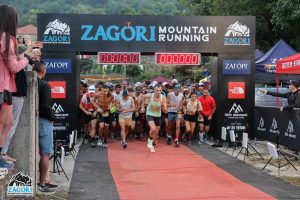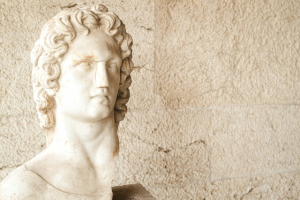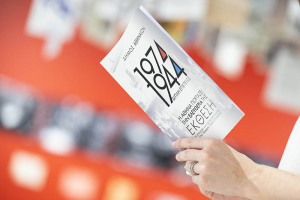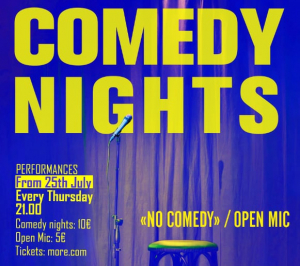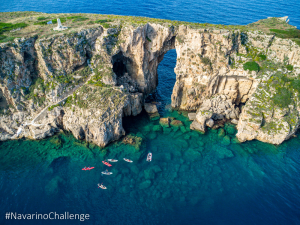XpatAthens
Monday, 29 July 2024 11:16
Participation Record With More Than 2,800 Runners From 35 Countries At Zagori Mountain Running 2024
Thousands of visitors gathered for the 13th year at the top celebration of the country’s biggest mountain trail running event, Zagori Mountain Running, held in Zagorochoria on July 19-21, 2024, with starting and finishing points in the village of Tsepelovo. The stone-built villages, traditional bridges, and unique attractions of Epirus, such as the Vikos Gorge, Vradeto Steps, Voidomatis River, Aoos Gorge, the imposing peaks of the Tymfi mountain range, the impressive Dragon Lake, and the protected natural wealth area of the Vikos-Aoos National Park, along with the rich biodiversity and excellent weather conditions, made the perfect setting for the biggest mountain running event in Greece.
More than 2,800 athletes, from 3 to 79 years old, and more than 11,000 visitors, visited Zagori for the three-day event, in a place included in the UNESCO World Heritage List, to experience this great festival of mountain sports tourism, share authentic experiences, and create memories in the place beyond the mountain. Athletes from 35 countries and 4 continents participated, including United States of America, Canada, Argentina, Colombia, China, Australia, New Zealand, Great Britain, Germany, France, Spain, Italy, Belgium, Denmark, Netherlands, Czech Republic, Sweden, Finland, Norway, Poland, Switzerland, Turkey, Ukraine, Russia, Israel, Georgia, Moldova, Serbia, Montenegro, Bulgaria, Romania, Albania, North Macedonia, Cyprus, and Greece.
Nearly all participants remained in the area for a minimum of three days, further promoting the Epirus Region and Municipality of Zagori tourism and boosting the local economy and businesses.
Nearly all participants remained in the area for a minimum of three days, further promoting the Epirus Region and Municipality of Zagori tourism and boosting the local economy and businesses.
Mountain Running for a Good Cause
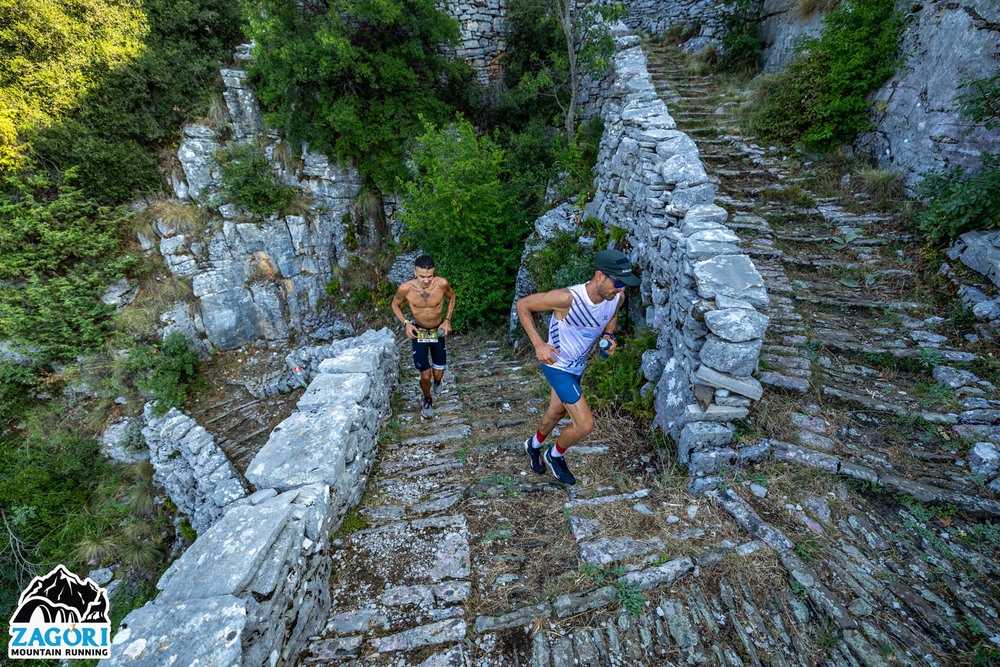

The official opening of Zagori Mountain Running 2024 took place on Friday, July 19, featuring a welcome and race presentation by the organizing committee, Mara Kalogirou, Vassilis Tzoumakas, and Alexandros Kalogirou. As part of this year’s event, the collectible bracelet of Zagori Mountain Running 2024 was presented, supporting the Bone Marrow Donor Center of the University of Patras (KEDMOP) – “Give Life” covering all costs for the laboratory analysis and storage of samples collected during the race days by the volunteer team “Dream Team – Give Life”.
Competition in the Place Beyond the Mountain
On Saturday, July 20, the TeRA race (60km) started, with a length of 60 kilometers and a positive elevation gain of nearly 4,000 meters. On the same day, the Half Marathon (21km) also started, featuring a unique route that crosses four traditional villages and bridges, including Hatsiou, Kokkori, and Tritoxo. 2 On Saturday afternoon, Tsepelovo was filled with smiles as over 400 children participated in the beloved race for the young friends, ZAGORAKI, supported by ZAGORI Natural Mineral Water. The first race day concluded with the Fun race (5km), which took place around the village of Tsepelovo, on a moderately challenging route with +240 meters of positive elevation, ideal for all those who wished to start mountain running.
Competition in the Place Beyond the Mountain
On Saturday, July 20, the TeRA race (60km) started, with a length of 60 kilometers and a positive elevation gain of nearly 4,000 meters. On the same day, the Half Marathon (21km) also started, featuring a unique route that crosses four traditional villages and bridges, including Hatsiou, Kokkori, and Tritoxo. 2 On Saturday afternoon, Tsepelovo was filled with smiles as over 400 children participated in the beloved race for the young friends, ZAGORAKI, supported by ZAGORI Natural Mineral Water. The first race day concluded with the Fun race (5km), which took place around the village of Tsepelovo, on a moderately challenging route with +240 meters of positive elevation, ideal for all those who wished to start mountain running.
On Sunday, July 21, the Zagori Classic Race (33km) started. A new stunning 33- kilometer route with a positive elevation gain of 2,100 meters, passing through 7 villages of Zagori, offering participants an incredible opportunity to discover their limits and enjoy the beauty of the mountain landscape. The Forest race (10km) followed. One of the most beautiful races of Zagori Mountain Running, which took place in a unique forest landscape. The Challenge race (60+33km) was the innovation of this year’s event, giving participants the opportunity to run both the TeRA (60km) and the Zagori Classic Race (33km), running two races back-to-back in 2 days.
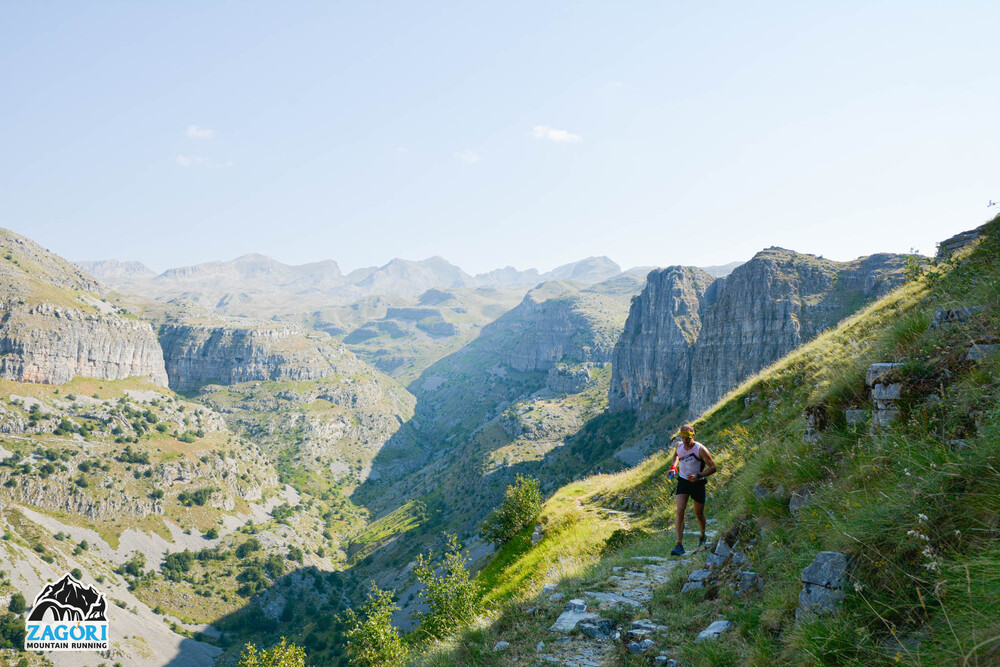

Results - Outstanding Athletes & Course Records
In the TeRA 60km race, in men’s category, Dimitris Seletis finished first with a course record, Dimitris Eleftheriou was second, and Theodoros Zisis third. In the women’s category, Maria Xanthou finished first, Nikoletta Tzavara was second, and Lemonia Panagiotou third.
In the new Zagori Classic Race (33km), in men’s category, Vasilis Balamotis finished first, Theodoros Ziakkas second, and Georgios Natsiopoulos third. In the women’s category, Fotini Meidani finished first, Marianna Barouti second, and Georgia Kanouta third.
In the new Challenge (60+33km) race, in men’s category, George Dimoulas was the winner, Christos Sakkas was second, and Nikos Rodopoulos third. In the women’s category, Lemonia Panagiotou took the first place, followed by Christina Chanou in the second place, and Fotini Theochadari in the third place.
In the Half Marathon (21km) race, in men’s category, Giorgos Stamoulis finished first with a course record, Nikos Ponireas was second, and Emmanouil Pourikas third. In the women’s category, Isabella Kotsacheili finished first with a course record, followed by Lamprini Liouta in the second place, and Theriani Tsiati in the third place.
In the Forest (10km) race, in men’s category, Giorgos Stamoulis finished first again with a course record, Stavros Gkinis was second, and Charalambos Delis third. In the women’s category, Chrysoula Vlissarouli and Pauline Bec finished first together, with Zoe Andrikopoulou finishing in the third place.
In the new Fun (5km) race, in men’s category, Nick Lampropoulos finished first, Orestis Papagiannis second, and Athanasios Zemadanis third. In the women’s category, Chrysoula Antonopoulou finished first, Melina Pargana second, and Maria Kazakou third.
ZAGORI Natural Mineral Water Hydrated and Refreshed Runners of all ages and Volunteers!
ZAGORI Natural Mineral Water supported this year’s Zagori Mountain Running as the Grand Sponsor, providing essential hydration and refreshment to all athletes, and also served as the Title Sponsor of the children’s race ZAGORAKI. ZAGORI could not be absent from this event given the company’s unwavering commitment to promoting sports and fair play, alongside the healthy diet it serves with its high-quality products. In this place, “beyond the mountain”, water is known as ZAGORI.
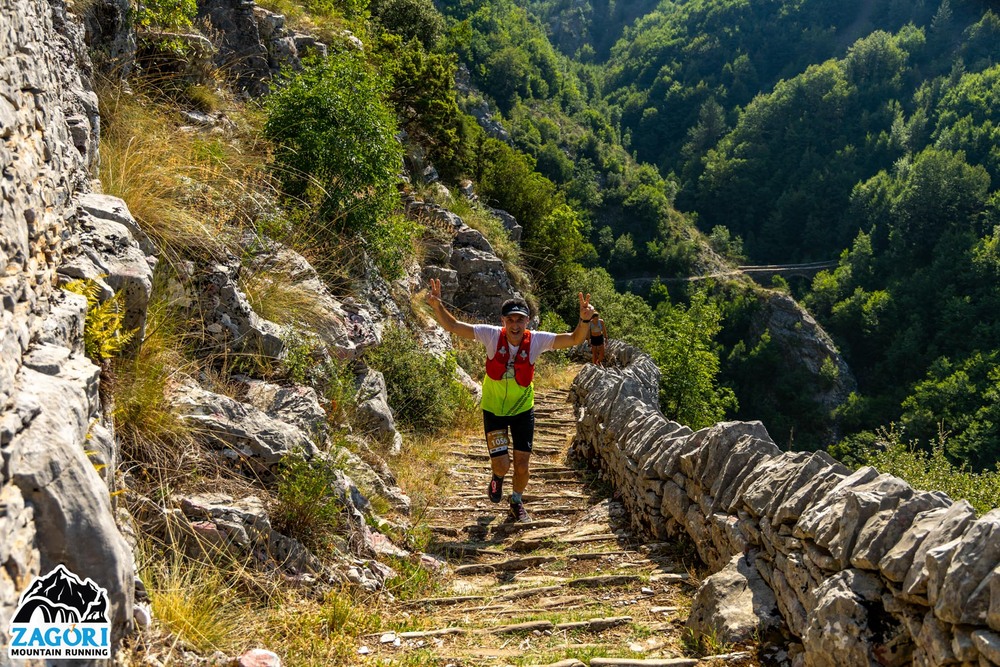

Unique Activities by The North Face
Once again, the top outdoor clothing and equipment company, The North Face, supported the 13 th Zagori Mountain Running as a Grand Sponsor. The North Face team supported the efforts of all runners at the special cheer-up areas, encouraging them every step of the way, while athletes who completed the TeRA and Classic Race 33km received unique finisher gifts from the company, reminding them of the strength, persistence, passion, and challenges they successfully overcame. Visitors admired and tried out the VECTIV Summit Pro series at The North Face booth, while the young explorers safely enjoyed the climbing wall of The North Face.
The Fifth Element Store Played a Leading Part and Raised Awareness
The Fifth Element company was once again a Grand Sponsor of Zagori Mountain Running, offering cash prizes and gift vouchers to athletes. The Fifth Element store, known for its dedication to high-quality sports and outdoor gear, played an active role this year in supporting environmental conservation. They contributed to the protection of nature and respect for the environment by backing the efforts of the Vikos–Aoos National Park. A portion of the proceeds from the sale of this year's collectible Buff® for Zagori Mountain Running 2024, which celebrates the seven most iconic peaks of Mount Tymfi, will be allocated to this cause.
In the context of this year’s Zagori Mountain Running, the owner of My Adventure and Fifth Element and race organizer, Mr. Vassilis Tzoumakas, stated: “We are happy and proud that for the 13th year we managed to organize the biggest mountain running race in Greece with absolute safety and respect for the environment, achieving record participation with over 2,800 runners. Athletes from 35 countries experienced unique moments and boosted tourism and the economy of this area. We sincerely thank all our sponsors for their support, the Epirus Region and the Municipality of Zagori for standing by us from the beginning, all partners who helped in the implementation, and of course, the volunteers who are an integral part of this mountain running celebration”.
During the event, the Melissa Pasta Parties held at Tsepelovo High School provided the necessary energy and helped the recovery of the TeRA and 33km athletes with the support of Melissa pasta.
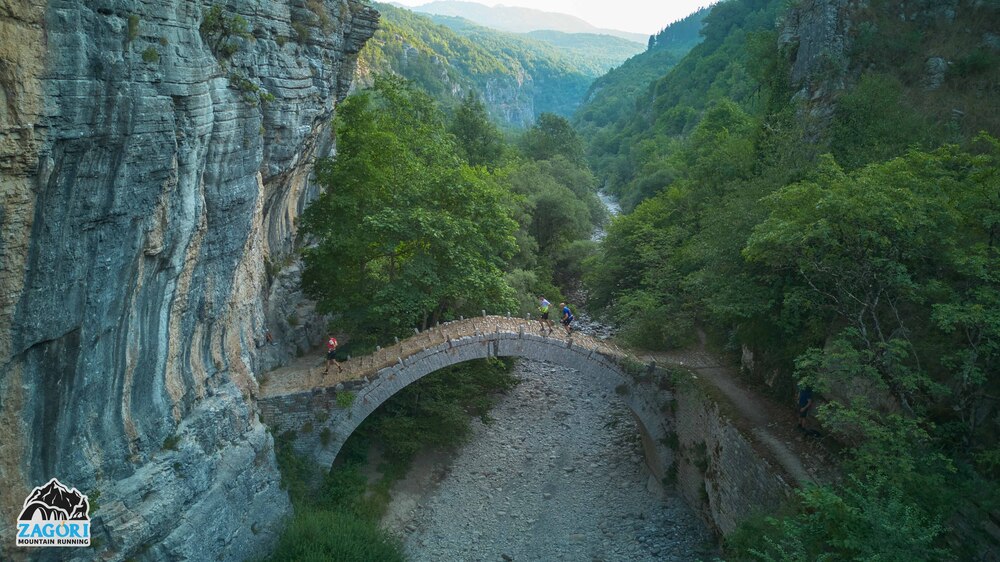

Distinctive Winner Prizes
This year’s winner prizes were handmade sculptures made of plaster and resin, created by Christina Sotiropoulou under the supervision of Mr. Ioannis Kokkalis, Assistant Professor of the School of Fine Arts of Ioannina, produced at the Sculpture Workshop of the School of Fine Arts of the University of Ioannina.
ZAGORI Natural Mineral Water, The North Face, and Fifth Element Adventure Store were the event’s Grand Sponsors.
JEEP AUTOLINEA Ioannina was the Mobility Sponsor.
Neversecond, Melissa, NOMAD Premium Greek Honey, Costa Coffee, Dole, PINDOS, Gold Nutrition, Green Cola, Igloo, RACE FACTORY, Agrino, Neubria, APU, Polo, Buff, Desocks, Yfantis, Dodoni, Sportbook Publications, Bliz, and Ostracon were the event’s Official Supporters.
Zagori Mountain Running was organized by My Adventure in collaboration with the Region of Epirus and the Municipality of Zagori.
Northern Pindos National Park and the Vikos-Aoos Geopark were the event’s Institutional Supporters.
The smooth implementation of the event was significantly aided by the support of the Volunteer Samaritan Corps of the Ioannina Branch of the Hellenic Red Cross, the Cultural Association of Tsepelovo “Anastasios Tsouflis”, and all the volunteers who assisted during the races on the routes, at the feed stations, and the finish line.
Neversecond, Melissa, NOMAD Premium Greek Honey, Costa Coffee, Dole, PINDOS, Gold Nutrition, Green Cola, Igloo, RACE FACTORY, Agrino, Neubria, APU, Polo, Buff, Desocks, Yfantis, Dodoni, Sportbook Publications, Bliz, and Ostracon were the event’s Official Supporters.
Zagori Mountain Running was organized by My Adventure in collaboration with the Region of Epirus and the Municipality of Zagori.
Northern Pindos National Park and the Vikos-Aoos Geopark were the event’s Institutional Supporters.
The smooth implementation of the event was significantly aided by the support of the Volunteer Samaritan Corps of the Ioannina Branch of the Hellenic Red Cross, the Cultural Association of Tsepelovo “Anastasios Tsouflis”, and all the volunteers who assisted during the races on the routes, at the feed stations, and the finish line.
#zagorirace2024 #zagorimountainrunning #zmr2024 #tymfissevensummits #theplacebeyondthemountain
Published in
Local News
Tagged under
Monday, 29 July 2024 10:58
Womb & Tomb: Alexander The Great & Family
An Interview with Dr. Paul Cartledge by Dr. Richard Marranca
In "Alexander: the Making of a God" (now on Netflix), we get to see some discoveries from Dr. Calliope Limneos-Papapakosta's excavation at Alexandria. Would Alexander's tomb be the greatest archaeological discovery?
Yes – and No. Yes, because it’s been sought for so long, speculated over so hard, and there’s a powerful mystique surrounding royal tombs (think – the Pyramids, the tomb of the first Chinese emperor, or … the Tombs of the Macedonian royals at Aigai, on which more below …). No, because I – like most sober, non-partisan observers and analysts – believe it’s been lost forever beneath the sea-waves that have long ago submerged the entire Royal Quarter of ancient Alexandria in Egypt.
Can we get our heads around the notion that Alexander had two fathers -- dual descent?
Olympias certainly did want everyone to believe that her firstborn son’s conception had something of the divine about it – though whether she fingered Zeus or an Egyptian-Greek variant of him, Ammon, is unclear. In another sense, regardless of what tale (myth) of his conception Olympias had put about, everyone would have accepted that Alexander as son of Philip II was at least descended from, even if not actually sired by, Zeus. This was because all Macedonian royals were considered to be lineally descended from Heracles, and Heracles was – in myth – sired by the greatest Olympian divinity of them all, Zeus.
Did Alexander believe that Artemis was present at his birth?
Artemis was indeed for all Greeks a goddess of childbirth – but she had no special Macedonian, let alone royal-Macedonian connections. Alexander’s Epirote mother much preferred Dionysus - and his house speciality of fermented grape-juice and associated ecstatic orgiastic rituals - to Artemis the perpetual virgin of the wild margins.
Murder at a Wedding
Why did Alexander have a falling out with his father, Philip?
Alexander too found the volatile, controlling Philip at best difficult, at worst impossible. So great had been his own estrangement, not too long before 336, that he had even gone into more or less involuntary temporary exile abroad. The issues between them were essentially personal, questions of power rather than of foreign policy objectives on which they were basically agreed.
And do you think it likely that Alexander and Olympias had a hand in Philip's murder?
I do think it very likely that Olympias had a hand in arranging Philip’s assassination – for, had Philip not been assassinated in 336, Philip and not Alexander would have led the planned Persian expedition that made Alexander’s name. Alexander would have been left behind at the Macedonian capital, Pella, to serve as Regent, a role he had performed (and exploited for personal advantage) already when only a teenager. By 336, Olympias had long ago fallen out with and been estranged from her husband. Over her son, however, she continued to exercise a powerful both attraction and domination. (He ‘joked’ that she charged him a high rent for the nine months she’d housed him in her womb.)
Tombs
Did Olympias' tomb or the tombs of Alexander's Persian wives ever get discovered?
Alexander’s mother Olympias was buried in Pydna, northern Greece – no question: written and documentary sources are agreed. But does the Tomb of Korinos house her tomb, as has been alleged? The jury is still out on that.
Alexander’s wives: he had three, simultaneously, all of them Iranian. The graves of none of them have been located.
What is Philip II's tomb like?
Only for Philip II (assassinated at Aigai in 336 BCE) has a seriously good case been made that his actual tomb has been located. Unfortunately, dispute continues over which of the earliest two of the three tombs excavated underneath the massive Aigai tumulus was his: was it Tomb I or II? Since II is more magnificent than I, in terms of its offerings, many have wanted it to be his, but there are legitimate doubts of a both chronological and osteological nature, suggesting that it is in fact that of Philip III Arrhidaeus, Alexander’s mentally impaired half-brother: Philip III of Macedon.
That would leave Tomb I for Philip II. One of its most famous features is an interior fresco depicting the abduction of Persephone (daughter of goddess Demeter) by Hades, eponymous ruler of the subterranean kingdom of the shades. (Tomb III is agreed to be that of Alexander IV, the ill-fated posthumous son of Alexander with his first wife, Rhoxane of (central Asian) Bactria or Sogdia.)
Alexander’s Death & Body Snatching
What caused Alexander’s Death?
How – or of what – Alexander died is one of history’s great mysteries. At one level, the question is binary: was it natural causes – or murder? If the former, what disease was it exactly that did for him at the tender age of nearly 33? If the latter, who – most – wanted him dead?
My historian’s instinct suggests that it was the unexpectedness, suddenness and prematurity of Alexander’s death, added to the king’s own known fears of assassination (but by force not poison), that gave rise to conspiracy theories of suspicious death – presumably by poisoning. More likely, in my view, is that he succumbed to some disease, his bodily resistance already fatally weakened due to a combination of near-death illnesses, grave war-wounds – and excessive alcohol consumption.
How and why did Alexander’s body get snatched?
As for how his – mummified – body ended up being buried in Egypt, first in Memphis, then at last in the new Egyptian capital he had founded, Alexandria, the story’s a bit complicated. Here are the headlines. Mummified in June 323 in Babylon, the corpse was somehow preserved there in southern Iraq until 321 when it was included in a grand cortege designed to transport it back to mainland Greece, for glorious reburial in the royal graveyard at Aigai (today’s Vergina). But near Damascus the caravan was intercepted, and the corpse hijacked, on the orders of Ptolemy son of Lagos, a Macedonian with whom Alexander had grown up and been educated, and whom Alexander had promoted to the highest status possible among his intimate Companions, that of one of his seven special Bodyguards.
Pharaohs: Alexander, Ptolemy, Cleopatra
Like the other Successors, Ptolemy had huge ambitions?
Under the immediate post-mortem carve-up of Alexander’s empire, Ptolemy became viceroy (satrap) of the vital province of Egypt. But he harboured grander ambitions: to emulate Alexander as Egyptian Pharaoh, even though he hadn’t a drop of royal blood in his veins. The capture of Alexander’s corpse as a talisman in 321 – and grandiose reburial in a specially built Mausoleum at Alexandria (the clue’s in the name) - were an earnest of his future intentions, realised in 305 BCE. Whence the ‘Ptolemaic’ ‘royal’ dynasty, culminating in the reign and suicide in 30 BCE of Cleopatra VII.
Richard Marranca is an author who teaches ancient world, myth, and religion at Montclair State University. He writes for various print and digital publications, and his upcoming book, "Speaking of the Dead: Mummies & Mysteries of Egypt," will be published by Blydyn Square Books. Richard has had the honor of receiving a Fulbright to teach at LMU Munich and spent a semester in Athens during his doctoral studies at New York University. In his career, Richard has had the privilege of interviewing esteemed classicist Paul Cartledge on topics ranging from Alexander the Great to Greek philosophy.
Yes – and No. Yes, because it’s been sought for so long, speculated over so hard, and there’s a powerful mystique surrounding royal tombs (think – the Pyramids, the tomb of the first Chinese emperor, or … the Tombs of the Macedonian royals at Aigai, on which more below …). No, because I – like most sober, non-partisan observers and analysts – believe it’s been lost forever beneath the sea-waves that have long ago submerged the entire Royal Quarter of ancient Alexandria in Egypt.
Can we get our heads around the notion that Alexander had two fathers -- dual descent?
Olympias certainly did want everyone to believe that her firstborn son’s conception had something of the divine about it – though whether she fingered Zeus or an Egyptian-Greek variant of him, Ammon, is unclear. In another sense, regardless of what tale (myth) of his conception Olympias had put about, everyone would have accepted that Alexander as son of Philip II was at least descended from, even if not actually sired by, Zeus. This was because all Macedonian royals were considered to be lineally descended from Heracles, and Heracles was – in myth – sired by the greatest Olympian divinity of them all, Zeus.
Did Alexander believe that Artemis was present at his birth?
Artemis was indeed for all Greeks a goddess of childbirth – but she had no special Macedonian, let alone royal-Macedonian connections. Alexander’s Epirote mother much preferred Dionysus - and his house speciality of fermented grape-juice and associated ecstatic orgiastic rituals - to Artemis the perpetual virgin of the wild margins.
Murder at a Wedding
Why did Alexander have a falling out with his father, Philip?
Alexander too found the volatile, controlling Philip at best difficult, at worst impossible. So great had been his own estrangement, not too long before 336, that he had even gone into more or less involuntary temporary exile abroad. The issues between them were essentially personal, questions of power rather than of foreign policy objectives on which they were basically agreed.
And do you think it likely that Alexander and Olympias had a hand in Philip's murder?
I do think it very likely that Olympias had a hand in arranging Philip’s assassination – for, had Philip not been assassinated in 336, Philip and not Alexander would have led the planned Persian expedition that made Alexander’s name. Alexander would have been left behind at the Macedonian capital, Pella, to serve as Regent, a role he had performed (and exploited for personal advantage) already when only a teenager. By 336, Olympias had long ago fallen out with and been estranged from her husband. Over her son, however, she continued to exercise a powerful both attraction and domination. (He ‘joked’ that she charged him a high rent for the nine months she’d housed him in her womb.)
Tombs
Did Olympias' tomb or the tombs of Alexander's Persian wives ever get discovered?
Alexander’s mother Olympias was buried in Pydna, northern Greece – no question: written and documentary sources are agreed. But does the Tomb of Korinos house her tomb, as has been alleged? The jury is still out on that.
Alexander’s wives: he had three, simultaneously, all of them Iranian. The graves of none of them have been located.
What is Philip II's tomb like?
Only for Philip II (assassinated at Aigai in 336 BCE) has a seriously good case been made that his actual tomb has been located. Unfortunately, dispute continues over which of the earliest two of the three tombs excavated underneath the massive Aigai tumulus was his: was it Tomb I or II? Since II is more magnificent than I, in terms of its offerings, many have wanted it to be his, but there are legitimate doubts of a both chronological and osteological nature, suggesting that it is in fact that of Philip III Arrhidaeus, Alexander’s mentally impaired half-brother: Philip III of Macedon.
That would leave Tomb I for Philip II. One of its most famous features is an interior fresco depicting the abduction of Persephone (daughter of goddess Demeter) by Hades, eponymous ruler of the subterranean kingdom of the shades. (Tomb III is agreed to be that of Alexander IV, the ill-fated posthumous son of Alexander with his first wife, Rhoxane of (central Asian) Bactria or Sogdia.)
Alexander’s Death & Body Snatching
What caused Alexander’s Death?
How – or of what – Alexander died is one of history’s great mysteries. At one level, the question is binary: was it natural causes – or murder? If the former, what disease was it exactly that did for him at the tender age of nearly 33? If the latter, who – most – wanted him dead?
My historian’s instinct suggests that it was the unexpectedness, suddenness and prematurity of Alexander’s death, added to the king’s own known fears of assassination (but by force not poison), that gave rise to conspiracy theories of suspicious death – presumably by poisoning. More likely, in my view, is that he succumbed to some disease, his bodily resistance already fatally weakened due to a combination of near-death illnesses, grave war-wounds – and excessive alcohol consumption.
How and why did Alexander’s body get snatched?
As for how his – mummified – body ended up being buried in Egypt, first in Memphis, then at last in the new Egyptian capital he had founded, Alexandria, the story’s a bit complicated. Here are the headlines. Mummified in June 323 in Babylon, the corpse was somehow preserved there in southern Iraq until 321 when it was included in a grand cortege designed to transport it back to mainland Greece, for glorious reburial in the royal graveyard at Aigai (today’s Vergina). But near Damascus the caravan was intercepted, and the corpse hijacked, on the orders of Ptolemy son of Lagos, a Macedonian with whom Alexander had grown up and been educated, and whom Alexander had promoted to the highest status possible among his intimate Companions, that of one of his seven special Bodyguards.
Pharaohs: Alexander, Ptolemy, Cleopatra
Like the other Successors, Ptolemy had huge ambitions?
Under the immediate post-mortem carve-up of Alexander’s empire, Ptolemy became viceroy (satrap) of the vital province of Egypt. But he harboured grander ambitions: to emulate Alexander as Egyptian Pharaoh, even though he hadn’t a drop of royal blood in his veins. The capture of Alexander’s corpse as a talisman in 321 – and grandiose reburial in a specially built Mausoleum at Alexandria (the clue’s in the name) - were an earnest of his future intentions, realised in 305 BCE. Whence the ‘Ptolemaic’ ‘royal’ dynasty, culminating in the reign and suicide in 30 BCE of Cleopatra VII.
Richard Marranca is an author who teaches ancient world, myth, and religion at Montclair State University. He writes for various print and digital publications, and his upcoming book, "Speaking of the Dead: Mummies & Mysteries of Egypt," will be published by Blydyn Square Books. Richard has had the honor of receiving a Fulbright to teach at LMU Munich and spent a semester in Athens during his doctoral studies at New York University. In his career, Richard has had the privilege of interviewing esteemed classicist Paul Cartledge on topics ranging from Alexander the Great to Greek philosophy.
Published in
Greek Philosophy & History
Tagged under
Thursday, 25 July 2024 12:17
1974 & 1944: Athens Celebrates Its Freedom
July 23 – October 28, 2024, Arts Center, Parko Eleftherias
On July 22nd the grand historical exhibition "1974 & 1944: Athens Celebrates Its Freedom" was presented for the first time to journalists, in the presence of the Mayor of Athens, Haris Doukas. This unique exhibition honors both landmark anniversaries for the city and the country: the 50 years since the restoration of democracy in 1974 and the 80 years since the liberation of Athens from Nazi occupation in 1944.
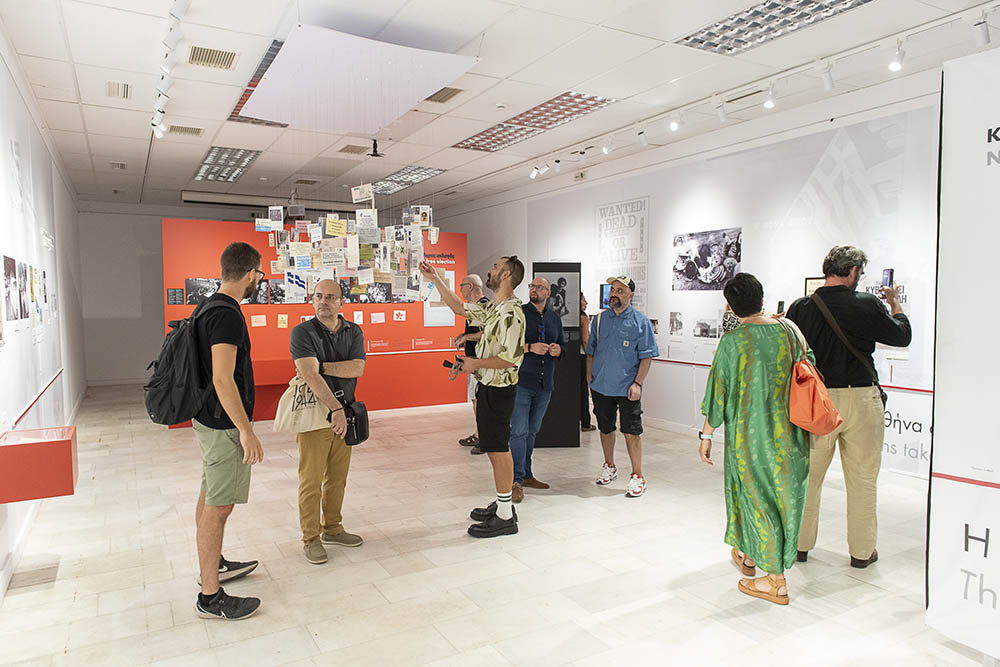
Designed and implemented by the Technopolis City of Athens in collaboration with the Contemporary Social History Archives (ASKI), the General State Archives, and the Historical Archive of the City of Athens, the exhibition is hosted in a space of particular historical significance, in the heart of Athens. The Arts Center of the Culture, Sports & Youth Organization of the City of Athens (OPANDA) at Parko Eleftherias is located in the monumental area of the old detention centers of the EAT-ESA Administration, and now serves as an important cultural space, a hub of free speech, creativity, and cultural renaissance.
In his greeting, Mayor Haris Doukas emphasized, "Every discussion about the past concerns the present and cares for the future. This saying of historians is the starting point for the rich activities and events organized by the City of Athens on the occasion of two landmark anniversaries: 80 years since the liberation of Athens from Nazi occupation and 50 years since the restoration of democracy in 1974. We want Athens to celebrate, remember, learn, reflect, look at its history, and especially consider the future. Defending our democracy is everyone's business. I think we need to take from this year's anniversary the need for a collective effort to safeguard what has been achieved."
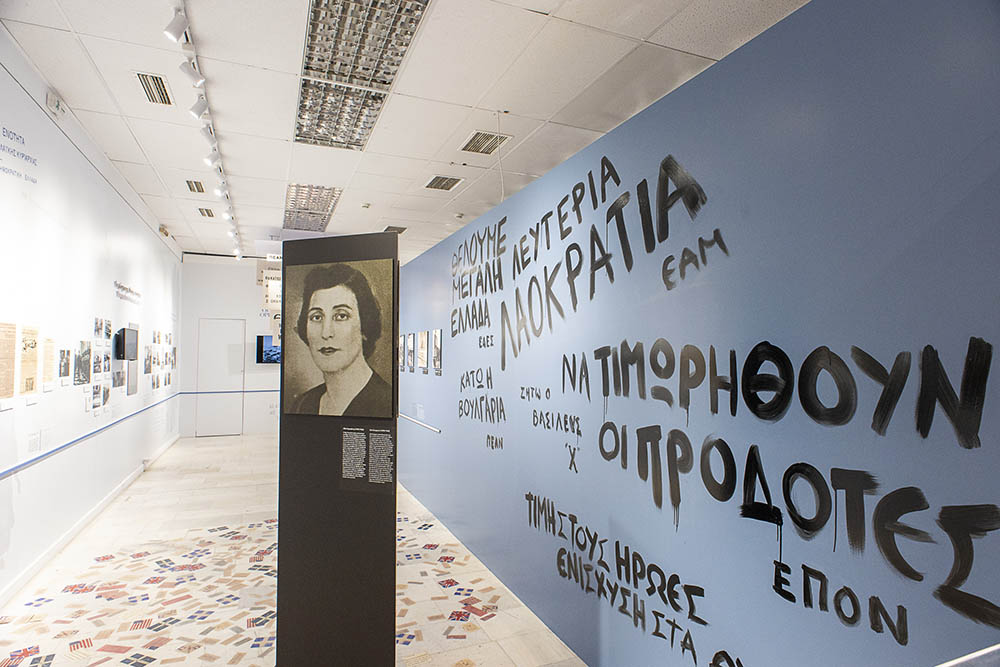
Conveying messages of optimism, the exhibition focuses on the feelings of joy and hope that these two great moments for Democracy and Freedom generated among Athenians, while also serving as the centerpiece of the rich program of anniversary events organized by the City of Athens throughout the city until November.
Mayor Haris Doukas and the attendees had the opportunity to tour the two main sections of the exhibition: "A Brief Breath of Freedom" and "The Great Moment of Democracy." Dedicated to the events of 1944 and 1974 respectively, they include more than 500 exhibits, including rare photographs, artworks, period newspapers, posters, proclamations, personal items, newsreels, and rich audiovisual archival material. The tour was conducted by Professor of Modern and Contemporary History at the University of Athens and scientific director of the exhibition, Vangelis Karamanolakis, who provided a lively and narrative approach to the historical context of the two anniversaries, highlighting the details, aspects, and emotions that stem from the rare exhibits of the exhibition.
Mr. Karamanolakis stated, "The exhibition is dedicated to two unique moments in the 20th-century Greek history. Two moments in which Athens was at the center of developments and celebrations. Without conflating the two anniversaries, of 1944 and 1974, the exhibition seeks to highlight the common elements that characterized them, as well as to reflect on each historical context and the different burdens each carried, leading in one case to civil conflict and in the other to the foundation of the Third Hellenic Republic. A tribute to those who fought for freedom, a libation to the joy and hopes born from the days of the fall of Nazi Occupation and the seven-year dictatorship."
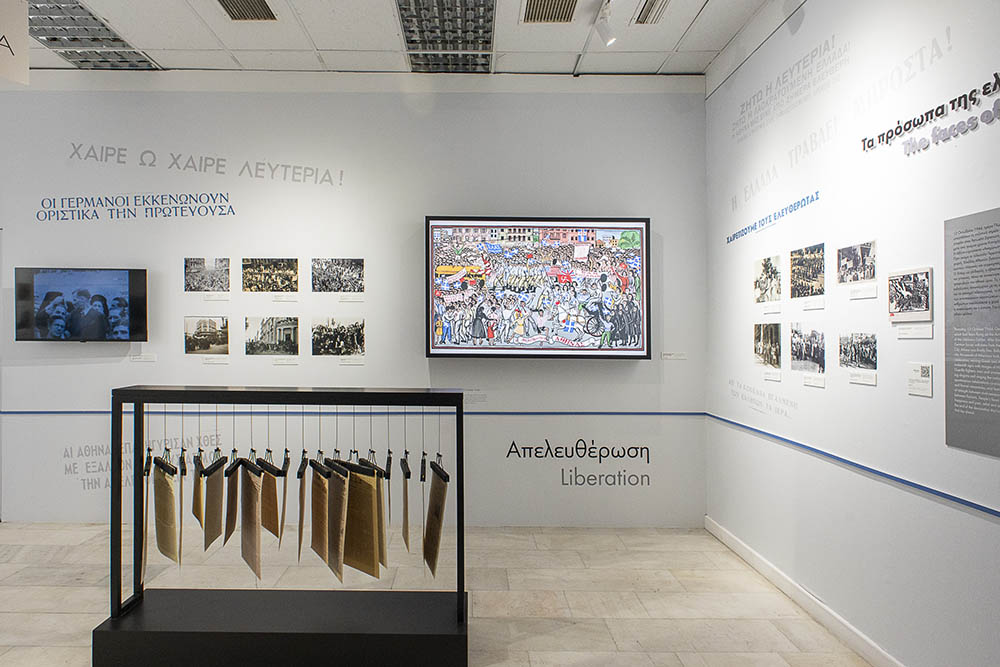
The exhibition "1974 & 1944: Athens Celebrates Its Freedom" is open to the public from July 23 to October 28, 2024, with free admission.
The City of Athens honors these two significant milestones for the country's free and democratic course as well as the struggles of the Greek people for national independence, freedom, and democracy, organizing a rich program of events. Through various performances, artistic and educational activities spread across many landmarks of Athens and its numerous neighborhoods until next November, with free admission for most of them, the City highlights the living historical memory of the city while opening a necessary dialogue with our recent history.
Starting in September, the activities include lectures, discussions, screenings, guided tours for adults, special guided tours by the exhibition curators, educational programs, and an insert of contemporary dance and dance performances.

Designed and implemented by the Technopolis City of Athens in collaboration with the Contemporary Social History Archives (ASKI), the General State Archives, and the Historical Archive of the City of Athens, the exhibition is hosted in a space of particular historical significance, in the heart of Athens. The Arts Center of the Culture, Sports & Youth Organization of the City of Athens (OPANDA) at Parko Eleftherias is located in the monumental area of the old detention centers of the EAT-ESA Administration, and now serves as an important cultural space, a hub of free speech, creativity, and cultural renaissance.
In his greeting, Mayor Haris Doukas emphasized, "Every discussion about the past concerns the present and cares for the future. This saying of historians is the starting point for the rich activities and events organized by the City of Athens on the occasion of two landmark anniversaries: 80 years since the liberation of Athens from Nazi occupation and 50 years since the restoration of democracy in 1974. We want Athens to celebrate, remember, learn, reflect, look at its history, and especially consider the future. Defending our democracy is everyone's business. I think we need to take from this year's anniversary the need for a collective effort to safeguard what has been achieved."

Conveying messages of optimism, the exhibition focuses on the feelings of joy and hope that these two great moments for Democracy and Freedom generated among Athenians, while also serving as the centerpiece of the rich program of anniversary events organized by the City of Athens throughout the city until November.
Mayor Haris Doukas and the attendees had the opportunity to tour the two main sections of the exhibition: "A Brief Breath of Freedom" and "The Great Moment of Democracy." Dedicated to the events of 1944 and 1974 respectively, they include more than 500 exhibits, including rare photographs, artworks, period newspapers, posters, proclamations, personal items, newsreels, and rich audiovisual archival material. The tour was conducted by Professor of Modern and Contemporary History at the University of Athens and scientific director of the exhibition, Vangelis Karamanolakis, who provided a lively and narrative approach to the historical context of the two anniversaries, highlighting the details, aspects, and emotions that stem from the rare exhibits of the exhibition.
Mr. Karamanolakis stated, "The exhibition is dedicated to two unique moments in the 20th-century Greek history. Two moments in which Athens was at the center of developments and celebrations. Without conflating the two anniversaries, of 1944 and 1974, the exhibition seeks to highlight the common elements that characterized them, as well as to reflect on each historical context and the different burdens each carried, leading in one case to civil conflict and in the other to the foundation of the Third Hellenic Republic. A tribute to those who fought for freedom, a libation to the joy and hopes born from the days of the fall of Nazi Occupation and the seven-year dictatorship."

The exhibition "1974 & 1944: Athens Celebrates Its Freedom" is open to the public from July 23 to October 28, 2024, with free admission.
The City of Athens honors these two significant milestones for the country's free and democratic course as well as the struggles of the Greek people for national independence, freedom, and democracy, organizing a rich program of events. Through various performances, artistic and educational activities spread across many landmarks of Athens and its numerous neighborhoods until next November, with free admission for most of them, the City highlights the living historical memory of the city while opening a necessary dialogue with our recent history.
Starting in September, the activities include lectures, discussions, screenings, guided tours for adults, special guided tours by the exhibition curators, educational programs, and an insert of contemporary dance and dance performances.
Published in
Local News
Tagged under
Tuesday, 23 July 2024 17:23
ΝΟ COMEDY - Comedy Nights At Theatre of the NO
Theatre of the NO, Athens' first English theatre, is excited to announce the launch of a weekly stand up comedy, called NO COMEDY, bringing laughter to the audience, every Thursday at 9:00 PM. Comedy enthusiasts can expect an exceptional lineup of internationally and local talented comedians who deliver sharp satire on the quirks of our daily lives and thoughts, promising endless laughter and entertainment.

Theatre of the NO offers a comfortable, air-conditioned venue with friendly staff and refreshing drinks, ensuring an enjoyable experience throughout the evening.

Open Mic Nights – Once a Month. In addition to the regular comedy nights, the NO COMEDY, will host emerging and seasoned comedians to showcase their talents before a live audience, offering comedy enthusiasts the chance to discover new and exciting comedic voices.

About THEATRE OF THE NO
Theatre of the NO is Athens' first English theatre, which opened its doors on April 18, 2024, with Samuel Beckett's "Waiting for Godot." The theatre established itself as a hub for artistic innovation, cultural exchange, and dialogue within the local and global community. With a diverse repertoire that includes classic and contemporary plays, poetry, experimental theatre, opera, live music, and stand-up comedy, Theatre of the NO strives to challenge and inspire its audience, creating transformative experiences.
PRODUCTION DETAILS
Cast: Walter, Anestis, Τasos, Dominik, Stauroula, Asim, Satamatis
Photography & Video: Endymionas
Communication & Public Relations: Eleftheria Sakareli
Production: FAIL BETTER PRODUCTIONS
PERFORMANCES
From 25th July Every Thursday at 21.00
Tickets
Comedy nights: 10€
Οpen Mic: 5€
Published in
Performing Arts
Tagged under
Monday, 28 April 2025 12:48
Exploring Greece: 3 Unique Road Trips Along The Country’s Most Beautiful Rivers
Greece is renowned for its stunning landscapes, from sun-kissed islands to ancient ruins, but its rivers also offer some of the country’s most breathtaking natural beauty. Embarking on a road trip along Greece's rivers provides a unique opportunity to explore serene waters, lush green valleys, and charming villages.
Of course, no epic road trip is complete without the right set of wheels. Discover Cars makes renting a car in Greece easy and hassle-free, offering everything from rugged SUVs for mountain adventures to compact cars perfect for charming village streets. With competitive rates, flexible booking options, a network of top-rated local providers, and no hidden fees Discover Cars gives you the freedom to explore at your own pace and with total confidence. Their platform also lets you easily compare prices and vehicle types, helping you find exactly what suits your trip. Having your own car means you can follow winding river roads, uncover hidden gems, and make spontaneous stops whenever a breathtaking view catches your eye. If you’re ready to turn your dream Greek road trip into reality, book your car today and hit the road the right way!
In the meantime, here are 3 unique Greek road trip ideas that take you through some of the country’s most picturesque river landscapes.
1. The Aoos River Route: From Metsovo to Konitsa
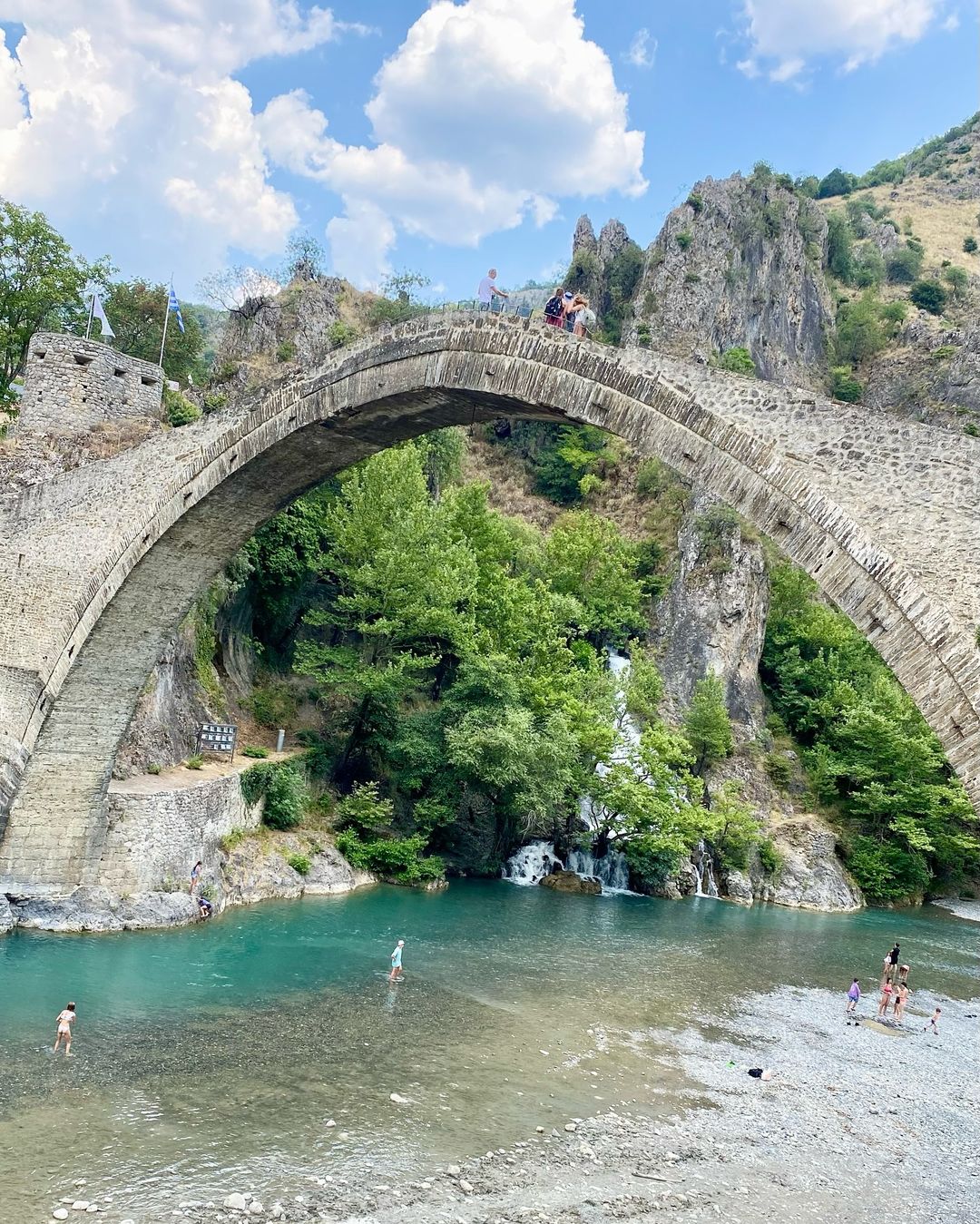
📍The stone bridge in Konitsa. 📷 @greece_islands
The Aoos River, flowing through the rugged Pindus mountain range, offers a captivating road trip through northwestern Greece. Start your journey in Metsovo, a charming mountain town known for its traditional architecture and local cheeses. From Metsovo, head towards the Zagori region, renowned for its picturesque villages and stunning stone bridges.
Of course, no epic road trip is complete without the right set of wheels. Discover Cars makes renting a car in Greece easy and hassle-free, offering everything from rugged SUVs for mountain adventures to compact cars perfect for charming village streets. With competitive rates, flexible booking options, a network of top-rated local providers, and no hidden fees Discover Cars gives you the freedom to explore at your own pace and with total confidence. Their platform also lets you easily compare prices and vehicle types, helping you find exactly what suits your trip. Having your own car means you can follow winding river roads, uncover hidden gems, and make spontaneous stops whenever a breathtaking view catches your eye. If you’re ready to turn your dream Greek road trip into reality, book your car today and hit the road the right way!
In the meantime, here are 3 unique Greek road trip ideas that take you through some of the country’s most picturesque river landscapes.
1. The Aoos River Route: From Metsovo to Konitsa

📍The stone bridge in Konitsa. 📷 @greece_islands
The Aoos River, flowing through the rugged Pindus mountain range, offers a captivating road trip through northwestern Greece. Start your journey in Metsovo, a charming mountain town known for its traditional architecture and local cheeses. From Metsovo, head towards the Zagori region, renowned for its picturesque villages and stunning stone bridges.
- Metsovo: Explore this vibrant town with its rich history, local museums, and cozy tavernas. Don’t miss out on the traditional Metsovone cheese and local wines.
- Zagori Villages: Drive through the scenic Vikos-Aoos National Park, where you'll encounter the historic villages of the Zagori region. Each village is unique, with traditional stone houses and breathtaking views of the Aoos River Gorge. The most famous village, Vitsa, is known for its stone-paved streets and beautiful old mansions.
- Konitsa: Your journey ends in Konitsa, a town with an impressive stone bridge spanning the Aoos River. Enjoy the natural beauty and explore the nearby Voidomatis River, one of Greece’s cleanest rivers.
2. The Nestos River Adventure: From Kallithea to Komotini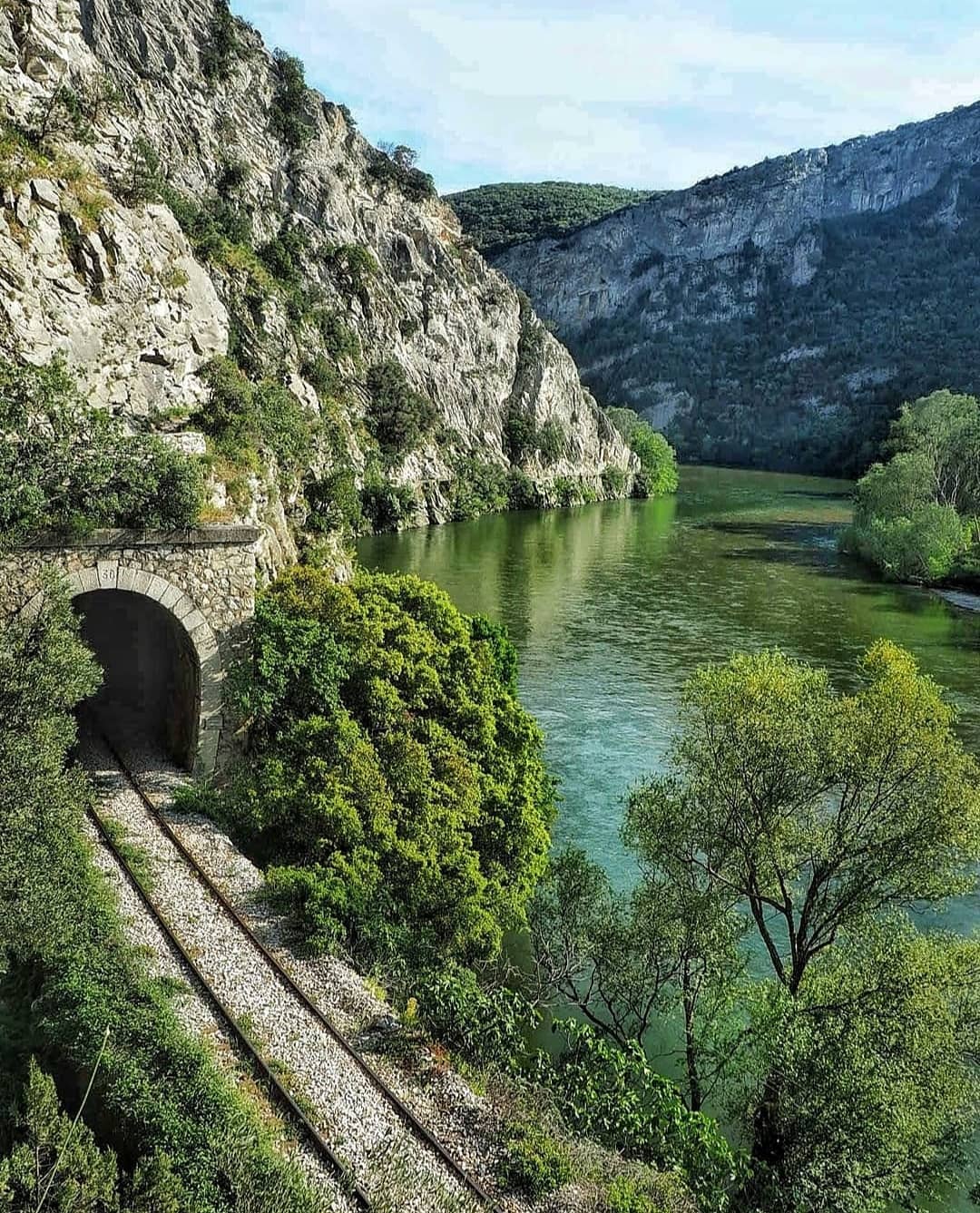
📍Stena Nestou. 📷 @jenny_kann
The Nestos River, flowing through northeastern Greece, provides a scenic route through diverse landscapes, from lush forests to ancient ruins. Start in Kallithea, a small town with easy access to the river.
- Kallithea: Begin your trip by exploring the tranquil waters of the Nestos River. Enjoy activities like kayaking or take a relaxing walk along the riverbanks.
- Stena Nestou: A highlight of this route is Stena Nestou, the impressive gorge where the Nestos River carves its way through the landscape. The dramatic cliffs and rugged terrain create a stunning backdrop for hiking and exploring the area's natural beauty.
- Xanthi: Drive through the picturesque town of Xanthi, famous for its vibrant market and Ottoman-era architecture. The town’s old bazaar is a great place to sample local delicacies and shop for traditional crafts.
- Komotini: Continue to Komotini, known for its rich history and multicultural influences. Visit the local museum and explore the charming old town. The area around Komotini is also home to beautiful nature reserves and the river’s scenic landscapes.
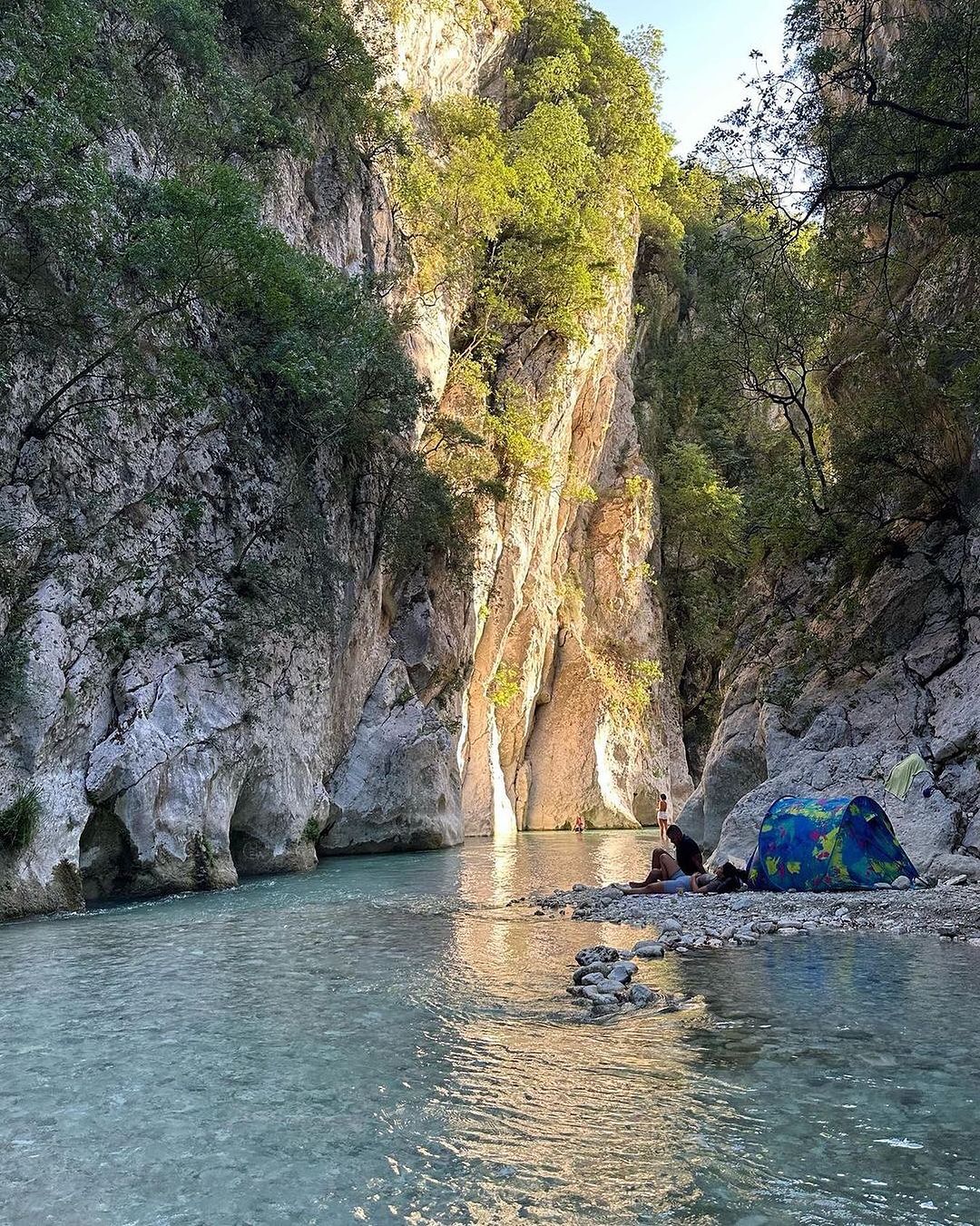
📍Acheron River. 📷 @dafnou_
The Acheron River, steeped in mythology as the river of the dead in ancient Greek lore, offers a mystical road trip through northwestern Greece. Start in Glyki, a small village near the river.
- Glyki: Begin your adventure in Glyki, where the river’s crystal-clear waters are a highlight. Enjoy a relaxing stroll along the river or take a boat ride to fully appreciate the natural beauty.
- Necromanteion of Acheron: Visit the ancient Necromanteion, an archaeological site dedicated to the ancient practice of necromancy. The site is located near the river and offers insights into ancient Greek rituals and beliefs.
- Parga: End your trip in the picturesque coastal town of Parga. With its beautiful beaches and charming harbor, Parga provides a perfect contrast to the river’s mystical and serene landscape. Enjoy the town’s vibrant nightlife and stunning views of the Ionian Sea.
These three road trips offer a unique way to experience Greece’s diverse landscapes, from the rugged mountains and lush valleys to the serene rivers and charming towns. Each route provides a blend of natural beauty, cultural heritage, and outdoor activities, making them ideal for those looking to explore the lesser-known sides of Greece. Whether you're seeking adventure or relaxation, these river routes offer something for every traveler.
Published in
Travel Greece
Tagged under
Monday, 22 July 2024 11:56
Olympic Spirit & Early Champions: A Conversation With Dr. Paul Cartledge
Introduction
Paul Cartledge, a renowned Greek classicist, has authored significant works on Alexander the Great, democracy, Thebes, and Sparta. He is a frequent contributor to BBC programs and the radio show "In Our Time." As the A. G. Leventis Professor of Greek Culture at the University of Cambridge, Cartledge has received numerous accolades, including prestigious awards from the city of Sparta. In a recent interview, Cartledge delves into the essence of the Olympic spirit and its reflection on the competitive nature of Greek city-states and human achievement. The below conversation illuminates the historical context and enduring legacy of the ancient Games, offering insights into the cultural and social dynamics that shaped one of history's most celebrated sporting events.
The Competitive Spirit of Greek City-States
What do the Olympics say about the competitive spirit of Greek city-states and about human achievement in general?
It’s important to be clear that, although Greek city-states went to a lot of trouble and expense to encourage and reward athletes from their home communities, competitors entered themselves as individuals and ran, boxed or whatever on their own account, not as ‘citizen of, say, Thebes’. The Games were administered by officials from the nearby city of Elis, 11 in number, who decided whether or not a potential competitor was fit enough to compete. There were indeed some ‘working class’ competitors, but, since achieving the high level of competence required to compete adequately demanded leisure and resources, most competitors came from the upper social orders. The spirit in which they competed was called in Greek agônia, competitiveness, from which English derives its word ‘agony’. Enough said. Any religious festival which included a contest could be called an agôn, which meant struggle, competition. Silver coins were struck bearing a symbolic emblem representing Agôn. The spirit in which ancient Greeks competed at the Olympics (and any other of the 50 or so Games being held in the Greek world in any one year) was extremely agonistic – and agonizing. Since only men could compete in person in any Olympic event (women might compete only indirectly, as owners of horses, mules or chariot-teams), other terms used for the ‘virtue’ displayed by successful athletes meant literally ‘manliness’ or ‘manly virtue’: aretê, andreia, andragathia.
The Importance of Winning
How important was winning?
Was there one winner, or a few top ones? Winning was not the main thing: it was the only thing. No silver or bronze medals at the ancient Olympics. On the other hand, there was no equivalent of a gold medal on offer, either (let alone the bounty now being ladled out): the winning was considered to be by itself glory enough, a token of divine favour, so the only prize on offer was a symbolic wreath made of leaves of sacred olive trees growing at Olympia.
Famous Competitors & Their Awards
Who were the most famous competitors? What were the awards?
Let’s start at the beginning. The first stade winner in 776 BCE was one Coroebus/Koroibos, a local boy from Elis. Ever after, the winner of that particular race gave his name to the Olympics as a whole, so that Olympiad 1 was ‘the Olympiad of Coroebus/Koroibos’. Even more famous, though, or notorious was the winner of the 15 th Olympiad in 720, Orsippus from Megara, just across the Isthmus of Corinth that divides the Peloponnese from central mainland Greece. His claim to – dubious - fame was that by the time he ended his 200-metre dash he was more lightly clad than when he’d started, having somehow ‘lost’ or shed whatever loincloth type thing he’d been wearing at the starting grid. That story’s highly dubious as a matter of fact, since it was invented to explain why runners ran stark naked, and that had almost certainly been the case from the word go, as it was universally the case for all athletic sports at Olympia later on.
Milon of Croton was a wrestler, peerless in a sport that the Greeks prized above all others except the stade race. He opened his Olympic account by winning the Boys’ event, then proceeded to win five adult wreaths in a row, in the 62 nd through 66 th Olympiads. Unsurprisingly for such a supreme athlete (cf. Muhammad Ali), Milon attracted a host of legendary stories in life, such as that he was capable of carrying a four-year-old cow the length of the Olympic stadium, but also in death: allegedly in trying to split a tree trunk with his bare hands he got them inextricably caught and thus became fodder for a wild animal.
Diagoras of Ialysus on the island of Rhodes, winner of the boxing at Olympia in 464 BCE, was commemorated not only by a statue at Olympia but also by an epinician (victory) ode composed by Pindar of Thebes (no 7 in his collection of Olympian Odes). Pindar was not one to belittle his own contribution to the fame of those whose victories he celebrated, but here he was comparatively restrained, and persuasively placed Diagoras’s victory under the sign of Charis, the goddess of Grace. Diagoras sired a veritable dynasty of successful athletes, and a daughter, Callipateira, whose impromptu self-exposure we have noted elsewhere.
Leonidas of Taras/Tarentum (modern Taranto in the instep of Italy) was – before Michael Phelps – the holder of the greatest tally of Olympic wreaths of all time, a round dozen won at four successive Olympiads between 164 and 152 BCE. He was a runner supreme, winning not only the stade and the two-stade (diaulos) races but also the race-in-armour (hoplitodromos). And since the Olympics programme was so compressed, he had to win all three on the same day – which he did, four times over.
I have left to the last Theogones or Theagenes from the island of Thasos. He was a boxer, but he was also a pancratiast and – the reason for climaxing with him – a periodonikês or ‘Circuit-winner’. See next answer for the nature of the Circuit. And besides wins at these most prestigious Circuit games he was reputed to have won altogether over 1300 prizes. It helped him achieve that feat that by the 5 th century there were in all a total of 50 or so games being staged per annum all over the Greek world.
Richard Marranca is an author who teaches ancient world, myth, and religion at Montclair State University. He writes for various print and digital publications, and his upcoming book, "Speaking of the Dead: Mummies & Mysteries of Egypt," will be published by Blydyn Square Books. Richard has had the honor of receiving a Fulbright to teach at LMU Munich and spent a semester in Athens during his doctoral studies at New York University. In his career, Richard has had the privilege of interviewing esteemed classicist Paul Cartledge on topics ranging from Alexander the Great to Greek philosophy.
Paul Cartledge, a renowned Greek classicist, has authored significant works on Alexander the Great, democracy, Thebes, and Sparta. He is a frequent contributor to BBC programs and the radio show "In Our Time." As the A. G. Leventis Professor of Greek Culture at the University of Cambridge, Cartledge has received numerous accolades, including prestigious awards from the city of Sparta. In a recent interview, Cartledge delves into the essence of the Olympic spirit and its reflection on the competitive nature of Greek city-states and human achievement. The below conversation illuminates the historical context and enduring legacy of the ancient Games, offering insights into the cultural and social dynamics that shaped one of history's most celebrated sporting events.
The Competitive Spirit of Greek City-States
What do the Olympics say about the competitive spirit of Greek city-states and about human achievement in general?
It’s important to be clear that, although Greek city-states went to a lot of trouble and expense to encourage and reward athletes from their home communities, competitors entered themselves as individuals and ran, boxed or whatever on their own account, not as ‘citizen of, say, Thebes’. The Games were administered by officials from the nearby city of Elis, 11 in number, who decided whether or not a potential competitor was fit enough to compete. There were indeed some ‘working class’ competitors, but, since achieving the high level of competence required to compete adequately demanded leisure and resources, most competitors came from the upper social orders. The spirit in which they competed was called in Greek agônia, competitiveness, from which English derives its word ‘agony’. Enough said. Any religious festival which included a contest could be called an agôn, which meant struggle, competition. Silver coins were struck bearing a symbolic emblem representing Agôn. The spirit in which ancient Greeks competed at the Olympics (and any other of the 50 or so Games being held in the Greek world in any one year) was extremely agonistic – and agonizing. Since only men could compete in person in any Olympic event (women might compete only indirectly, as owners of horses, mules or chariot-teams), other terms used for the ‘virtue’ displayed by successful athletes meant literally ‘manliness’ or ‘manly virtue’: aretê, andreia, andragathia.
The Importance of Winning
How important was winning?
Was there one winner, or a few top ones? Winning was not the main thing: it was the only thing. No silver or bronze medals at the ancient Olympics. On the other hand, there was no equivalent of a gold medal on offer, either (let alone the bounty now being ladled out): the winning was considered to be by itself glory enough, a token of divine favour, so the only prize on offer was a symbolic wreath made of leaves of sacred olive trees growing at Olympia.
Famous Competitors & Their Awards
Who were the most famous competitors? What were the awards?
Let’s start at the beginning. The first stade winner in 776 BCE was one Coroebus/Koroibos, a local boy from Elis. Ever after, the winner of that particular race gave his name to the Olympics as a whole, so that Olympiad 1 was ‘the Olympiad of Coroebus/Koroibos’. Even more famous, though, or notorious was the winner of the 15 th Olympiad in 720, Orsippus from Megara, just across the Isthmus of Corinth that divides the Peloponnese from central mainland Greece. His claim to – dubious - fame was that by the time he ended his 200-metre dash he was more lightly clad than when he’d started, having somehow ‘lost’ or shed whatever loincloth type thing he’d been wearing at the starting grid. That story’s highly dubious as a matter of fact, since it was invented to explain why runners ran stark naked, and that had almost certainly been the case from the word go, as it was universally the case for all athletic sports at Olympia later on.
Milon of Croton was a wrestler, peerless in a sport that the Greeks prized above all others except the stade race. He opened his Olympic account by winning the Boys’ event, then proceeded to win five adult wreaths in a row, in the 62 nd through 66 th Olympiads. Unsurprisingly for such a supreme athlete (cf. Muhammad Ali), Milon attracted a host of legendary stories in life, such as that he was capable of carrying a four-year-old cow the length of the Olympic stadium, but also in death: allegedly in trying to split a tree trunk with his bare hands he got them inextricably caught and thus became fodder for a wild animal.
Diagoras of Ialysus on the island of Rhodes, winner of the boxing at Olympia in 464 BCE, was commemorated not only by a statue at Olympia but also by an epinician (victory) ode composed by Pindar of Thebes (no 7 in his collection of Olympian Odes). Pindar was not one to belittle his own contribution to the fame of those whose victories he celebrated, but here he was comparatively restrained, and persuasively placed Diagoras’s victory under the sign of Charis, the goddess of Grace. Diagoras sired a veritable dynasty of successful athletes, and a daughter, Callipateira, whose impromptu self-exposure we have noted elsewhere.
Leonidas of Taras/Tarentum (modern Taranto in the instep of Italy) was – before Michael Phelps – the holder of the greatest tally of Olympic wreaths of all time, a round dozen won at four successive Olympiads between 164 and 152 BCE. He was a runner supreme, winning not only the stade and the two-stade (diaulos) races but also the race-in-armour (hoplitodromos). And since the Olympics programme was so compressed, he had to win all three on the same day – which he did, four times over.
I have left to the last Theogones or Theagenes from the island of Thasos. He was a boxer, but he was also a pancratiast and – the reason for climaxing with him – a periodonikês or ‘Circuit-winner’. See next answer for the nature of the Circuit. And besides wins at these most prestigious Circuit games he was reputed to have won altogether over 1300 prizes. It helped him achieve that feat that by the 5 th century there were in all a total of 50 or so games being staged per annum all over the Greek world.
Richard Marranca is an author who teaches ancient world, myth, and religion at Montclair State University. He writes for various print and digital publications, and his upcoming book, "Speaking of the Dead: Mummies & Mysteries of Egypt," will be published by Blydyn Square Books. Richard has had the honor of receiving a Fulbright to teach at LMU Munich and spent a semester in Athens during his doctoral studies at New York University. In his career, Richard has had the privilege of interviewing esteemed classicist Paul Cartledge on topics ranging from Alexander the Great to Greek philosophy.
Published in
Greek Philosophy & History
Tagged under
Friday, 19 July 2024 15:49
Why Having A Content & Website Company By Your Side Is Crucial For Your Business Success
In today’s digital age, a strong online presence is no longer optional—it’s essential. Whether you’re a startup or an established business, having a content and website company by your side can be the difference between thriving and merely surviving. Here’s why partnering with experts in content creation and web development is crucial for your business success.
1. First Impressions Matter
Your website is often the first interaction potential customers have with your brand. A professionally designed, user-friendly site creates a positive first impression, showcasing your brand’s professionalism and reliability. A content and website company ensures your site is visually appealing, easy to navigate, and optimized for both desktop and mobile devices.
2. Expertise & Experience
Creating and maintaining a high-quality website requires a variety of skills, including web design, development, content writing, SEO, and digital marketing. A content and website company brings together experts in all these areas, ensuring your site is built and maintained to the highest standards. This expertise helps in addressing technical issues promptly, keeping your website up-to-date with the latest trends and technologies.
3. SEO & Visibility
A beautifully designed website is only effective if people can find it. Search Engine Optimization (SEO) is critical for improving your site’s visibility on search engines like Google. Content and website companies have specialized knowledge in SEO best practices, helping your site rank higher in search results, drive organic traffic, and reach your target audience more effectively.
4. Quality Content Creation
Content is king in the digital world. High-quality, engaging content helps attract, inform, and convert visitors into customers. A content and website company can craft compelling blog posts, articles, videos, and other forms of content that resonate with your audience. They ensure your content strategy aligns with your business goals, improving customer engagement and driving conversions.
5. Consistency & Branding
Maintaining a consistent brand voice and image across all online platforms is essential for building trust and recognition. A content and website company ensures that your website, social media, and other digital assets reflect a cohesive brand identity. This consistency helps establish credibility and makes your business more memorable to customers.
6. Time & Cost Efficiency
Building and maintaining a website and creating quality content can be time-consuming and costly if done in-house, especially without the right expertise. By outsourcing these tasks to a professional company, you can focus on what you do best—running your business. It also reduces the risk of costly mistakes and ensures your online presence is managed efficiently.
7. Adapting to Change
The digital landscape is constantly evolving. New technologies, algorithms, and trends can impact your online presence. A content and website company stays abreast of these changes, ensuring your site and content remain relevant and effective. They can quickly adapt strategies to meet new challenges, keeping your business competitive.
8. Data-Driven Decisions
Professional content and website companies use analytics and data to measure the performance of your site and content. They provide insights into what’s working and what’s not, allowing for data-driven decisions to improve your online strategy. This continuous improvement helps maximize your return on investment.
9. Customer Engagement & Interaction
An interactive, well-maintained website can significantly enhance customer engagement. Features like live chat, contact forms, and social media integration make it easier for customers to connect with your business. Content and website companies can implement these features and ensure they function smoothly, improving customer satisfaction and loyalty.
In a competitive market, having a content and website company by your side is not just an advantage—it’s a necessity. They bring the expertise, efficiency, and innovation needed to build a strong online presence, attract and retain customers, and ultimately drive business success. Investing in professional content and website services is an investment in the future of your business. Don’t leave your digital success to chance; partner with the experts and watch your business thrive.
1. First Impressions Matter
Your website is often the first interaction potential customers have with your brand. A professionally designed, user-friendly site creates a positive first impression, showcasing your brand’s professionalism and reliability. A content and website company ensures your site is visually appealing, easy to navigate, and optimized for both desktop and mobile devices.
2. Expertise & Experience
Creating and maintaining a high-quality website requires a variety of skills, including web design, development, content writing, SEO, and digital marketing. A content and website company brings together experts in all these areas, ensuring your site is built and maintained to the highest standards. This expertise helps in addressing technical issues promptly, keeping your website up-to-date with the latest trends and technologies.
3. SEO & Visibility
A beautifully designed website is only effective if people can find it. Search Engine Optimization (SEO) is critical for improving your site’s visibility on search engines like Google. Content and website companies have specialized knowledge in SEO best practices, helping your site rank higher in search results, drive organic traffic, and reach your target audience more effectively.
4. Quality Content Creation
Content is king in the digital world. High-quality, engaging content helps attract, inform, and convert visitors into customers. A content and website company can craft compelling blog posts, articles, videos, and other forms of content that resonate with your audience. They ensure your content strategy aligns with your business goals, improving customer engagement and driving conversions.
5. Consistency & Branding
Maintaining a consistent brand voice and image across all online platforms is essential for building trust and recognition. A content and website company ensures that your website, social media, and other digital assets reflect a cohesive brand identity. This consistency helps establish credibility and makes your business more memorable to customers.
6. Time & Cost Efficiency
Building and maintaining a website and creating quality content can be time-consuming and costly if done in-house, especially without the right expertise. By outsourcing these tasks to a professional company, you can focus on what you do best—running your business. It also reduces the risk of costly mistakes and ensures your online presence is managed efficiently.
7. Adapting to Change
The digital landscape is constantly evolving. New technologies, algorithms, and trends can impact your online presence. A content and website company stays abreast of these changes, ensuring your site and content remain relevant and effective. They can quickly adapt strategies to meet new challenges, keeping your business competitive.
8. Data-Driven Decisions
Professional content and website companies use analytics and data to measure the performance of your site and content. They provide insights into what’s working and what’s not, allowing for data-driven decisions to improve your online strategy. This continuous improvement helps maximize your return on investment.
9. Customer Engagement & Interaction
An interactive, well-maintained website can significantly enhance customer engagement. Features like live chat, contact forms, and social media integration make it easier for customers to connect with your business. Content and website companies can implement these features and ensure they function smoothly, improving customer satisfaction and loyalty.
In a competitive market, having a content and website company by your side is not just an advantage—it’s a necessity. They bring the expertise, efficiency, and innovation needed to build a strong online presence, attract and retain customers, and ultimately drive business success. Investing in professional content and website services is an investment in the future of your business. Don’t leave your digital success to chance; partner with the experts and watch your business thrive.
Published in
Tips & Advice
Tagged under
Friday, 19 July 2024 14:46
Unique Outdoor Activities for Everyone at Navarino Challenge 2024
The sports tourism and wellness event Navarino Challenge updates its schedule annually with new activities for people of all ages and abilities. With the message “sports unites people” Navarino Challenge will be held for the 12th year on October 18-20, 2024, at Costa Navarino and Pylos. More than 55 activities will be hosted at two of the destination’s four hotels, W Costa Navarino and The Westin Resort Costa Navarino.
The North Face Athletes to Run the Scenic Routes of Navarino Challenge
This year, the team of athletes from The North Face is expected to have a dynamic presence, competing in the top Half Marathon powered by The North Face with athletes Giorgos Dimoulas, Alexandros Tzoumakas, and Nikoletta Tzavara, discovering the exciting route that crosses Voidokilia and combines dirt, sand, and asphalt with the message “Never Stop Exploring”.
Register for the Running Activities
Participants can join the 21.1km route powered by The North Face, 10km, 5km powered by Miele, and 1km races right away. The children’s race is free of charge. Register through the special form available at the following link.
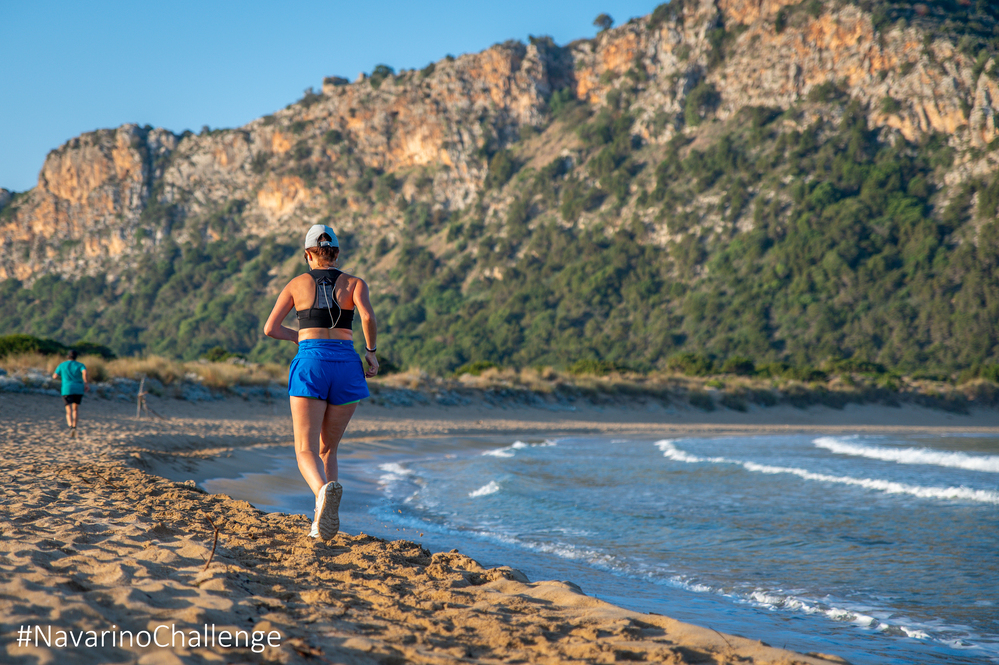
High-Intensity Training & CrossFit with Dimitris Moros
In collaboration with the top physical education professor Dimitris Moros and FitnessArt, Navarino Challenge will also conduct CrossFit activities powered by Squatwolf and high-intensity training powered by Squatwolf, ensuring the muscular strengthening of the participants. Squatwolf, the Premium Gymwear Brand from DUBAI, which came to Greece exclusively by SportAdore is participating for the first time in a Greek sports event, presenting technical gym clothes that elevate training to another level.
Water Activities with Moraitis Watersports
The beloved water sports that made a dynamic debut last year will once again feature the name and signature of Moraitis Watersports. Sea and adrenaline lovers can choose from a wide variety of activities in the historic Bay of Navarino through three different vouchers. The “Watersports Voucher 1” includes Windsurf and Kayak Tour. The “Watersports Voucher 2” includes Wakeboard, Waterski, Wakesurf, and Wingfoil, with 10% of the proceeds going to the charity action “Sharing Is Caring” and to 12 NGOs. Finally, the “Watersports Voucher 3” includes e-Foil, Kitesurf, and Catamaran activities. Participation in the activities requires booking accommodation at Costa Navarino through Navarino Challenge. Register through the special form available at the following link.
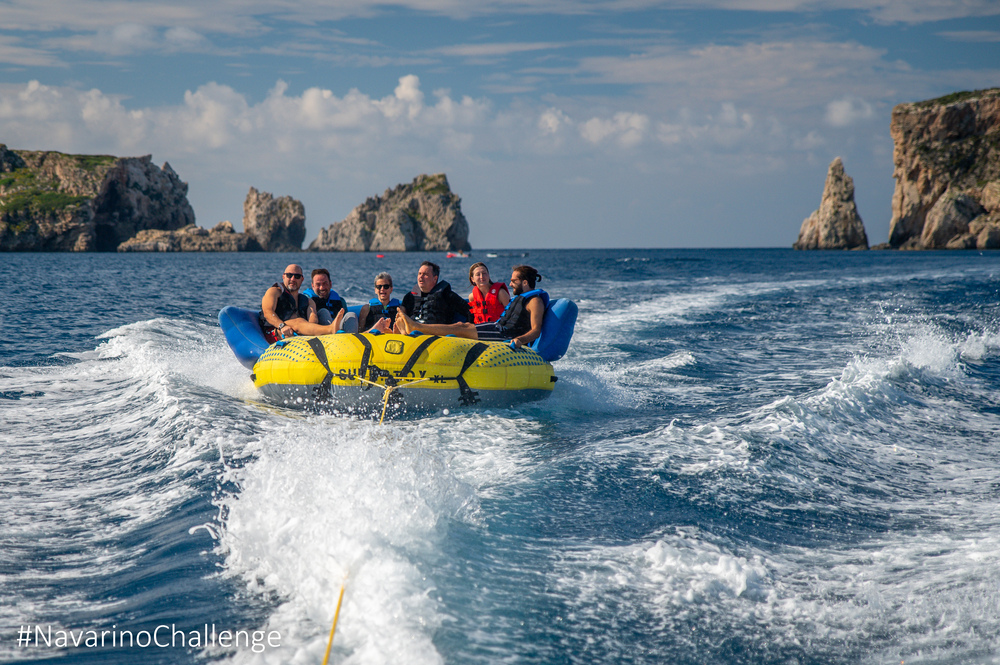
Beach Volleyball with Michalis Triantafyllidis
In collaboration with the former international volleyball player and record- holder for national team appearances, Michalis Triantafyllidis, and Triantafyllidis Beach Arena, the King of the Court Beach Volleyball Tournaments powered by Bacardi will be held again this year. In anticipation of the NAVARINO CHALLENGE King of the Court event, which will be held at the Dunes Beach at Costa Navarino, Triantafyllidis Beach Arena is organizing a series of tournaments this summer: the BEACH ARENA CHALLENGE King of the Court. The top 2 champions from the entire series, will win free participation in the exciting NAVARINO CHALLENGE King of the Court and complimentary accommodation in Pylos, while there will be a draw for 5 free entries in the NAVARINO CHALLENGE King of the Court. For more information: www.beacharena.gr
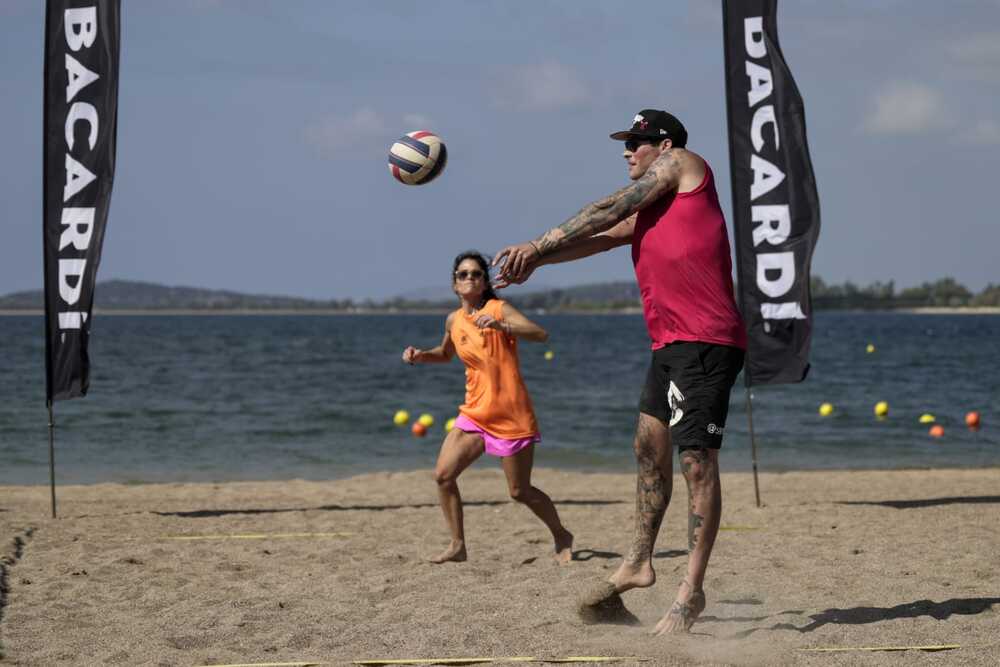
Book your accommodation package now
Enjoy a weekend full of outdoor sports activities for all ages. Book now the complete sports activities package and experience a unique sports and cultural event. For more information on accommodation packages at W Costa Navarino and The Westin Resort Costa Navarino please email booking(at)navarinochallenge.com or call Vita N Travel at +30 210 3249070. Check the accommodation packages here.
Miele is the Platinum Sponsor.
MOTODYNAMICS Group is the Gold Sponsor.
Costa Navarino, W Costa Navarino, and The Westin Resort Costa Navarino are the Official Hospitality Sponsors.
Knorr, and The North Face are the Silver Sponsors.
Vikos Natural Mineral Water is the Official Water.
Luanvi is the Official Sports Supplier.
KORRES, Trace ‘n Chase, and Pilia Express are the Bronze Sponsors.
SIXT, a member of the MOTODYNAMICS Group is the event’s Premium Mobility Partner.
Navarino Icons is the event’s Authentic Flavor Partner.
Messinian Nest, Municipality of Pylos-Nestor, Bacardi, Poseidonia Restaurant, Karalis Beach Hotel, and Karalis City Hotel & Spa are the event’s Partners.
Kois Optics are the Official Optics Partner.
Vlaha, Phee, Messinian Spa, and Zoe Resort are the Supporters.
SKAI is the Premium TV Partner. Liquid Media is the Premium Media Partner.
Athens Medical Group is the Medical Partner.
p³ = Plastic Pollution Prevention is the Sustainability Partner.
Athens University of Economics and Business is the event’s Educational Partner.
Angelic Yoga Arts, Falcons Football Academy, FitnessArt, Gymnastics Stars, Moraitis Watersports, Mouratoglou Tennis Center Costa Navarino, Navarino Golf Academy, Navarino Outdoors, Pilates by Mandy, Red Swim Academy, Swim O’ Clock, Triantafyllidis Beach Arena are the Athletic Partners.
The event is Assisted by Vita N Travel, and Pylos Association of Enterprises for Tourism Development.
Navarino Challenge will be held under the auspices of the Ministry of Tourism, the Greek National Tourism Organization, and the Region of Peloponnese.
The event is organized by ActiveMedia Group, which is also responsible for the event’s Sports Production.
More information about this year’s activities and schedule will be announced in the coming weeks.
#navarinochallenge #costanavarino #sportsunitespeople #eatwell #runwell #livewell
Website: www.navarinochallenge.com
Facebook: www.facebook.com/Navarinochallenge
Instagram: http://instagram.com/navarinochallenge
Twitter: https://twitter.com/NavarinoC
YouTube: http://www.youtube.com/user/NavarinoChallenge
TikTok: https://www.tiktok.com/@navarino_challenge
The North Face Athletes to Run the Scenic Routes of Navarino Challenge
This year, the team of athletes from The North Face is expected to have a dynamic presence, competing in the top Half Marathon powered by The North Face with athletes Giorgos Dimoulas, Alexandros Tzoumakas, and Nikoletta Tzavara, discovering the exciting route that crosses Voidokilia and combines dirt, sand, and asphalt with the message “Never Stop Exploring”.
Register for the Running Activities
Participants can join the 21.1km route powered by The North Face, 10km, 5km powered by Miele, and 1km races right away. The children’s race is free of charge. Register through the special form available at the following link.

High-Intensity Training & CrossFit with Dimitris Moros
In collaboration with the top physical education professor Dimitris Moros and FitnessArt, Navarino Challenge will also conduct CrossFit activities powered by Squatwolf and high-intensity training powered by Squatwolf, ensuring the muscular strengthening of the participants. Squatwolf, the Premium Gymwear Brand from DUBAI, which came to Greece exclusively by SportAdore is participating for the first time in a Greek sports event, presenting technical gym clothes that elevate training to another level.
Water Activities with Moraitis Watersports
The beloved water sports that made a dynamic debut last year will once again feature the name and signature of Moraitis Watersports. Sea and adrenaline lovers can choose from a wide variety of activities in the historic Bay of Navarino through three different vouchers. The “Watersports Voucher 1” includes Windsurf and Kayak Tour. The “Watersports Voucher 2” includes Wakeboard, Waterski, Wakesurf, and Wingfoil, with 10% of the proceeds going to the charity action “Sharing Is Caring” and to 12 NGOs. Finally, the “Watersports Voucher 3” includes e-Foil, Kitesurf, and Catamaran activities. Participation in the activities requires booking accommodation at Costa Navarino through Navarino Challenge. Register through the special form available at the following link.

Beach Volleyball with Michalis Triantafyllidis
In collaboration with the former international volleyball player and record- holder for national team appearances, Michalis Triantafyllidis, and Triantafyllidis Beach Arena, the King of the Court Beach Volleyball Tournaments powered by Bacardi will be held again this year. In anticipation of the NAVARINO CHALLENGE King of the Court event, which will be held at the Dunes Beach at Costa Navarino, Triantafyllidis Beach Arena is organizing a series of tournaments this summer: the BEACH ARENA CHALLENGE King of the Court. The top 2 champions from the entire series, will win free participation in the exciting NAVARINO CHALLENGE King of the Court and complimentary accommodation in Pylos, while there will be a draw for 5 free entries in the NAVARINO CHALLENGE King of the Court. For more information: www.beacharena.gr

Book your accommodation package now
Enjoy a weekend full of outdoor sports activities for all ages. Book now the complete sports activities package and experience a unique sports and cultural event. For more information on accommodation packages at W Costa Navarino and The Westin Resort Costa Navarino please email booking(at)navarinochallenge.com or call Vita N Travel at +30 210 3249070. Check the accommodation packages here.
Miele is the Platinum Sponsor.
MOTODYNAMICS Group is the Gold Sponsor.
Costa Navarino, W Costa Navarino, and The Westin Resort Costa Navarino are the Official Hospitality Sponsors.
Knorr, and The North Face are the Silver Sponsors.
Vikos Natural Mineral Water is the Official Water.
Luanvi is the Official Sports Supplier.
KORRES, Trace ‘n Chase, and Pilia Express are the Bronze Sponsors.
SIXT, a member of the MOTODYNAMICS Group is the event’s Premium Mobility Partner.
Navarino Icons is the event’s Authentic Flavor Partner.
Messinian Nest, Municipality of Pylos-Nestor, Bacardi, Poseidonia Restaurant, Karalis Beach Hotel, and Karalis City Hotel & Spa are the event’s Partners.
Kois Optics are the Official Optics Partner.
Vlaha, Phee, Messinian Spa, and Zoe Resort are the Supporters.
SKAI is the Premium TV Partner. Liquid Media is the Premium Media Partner.
Athens Medical Group is the Medical Partner.
p³ = Plastic Pollution Prevention is the Sustainability Partner.
Athens University of Economics and Business is the event’s Educational Partner.
Angelic Yoga Arts, Falcons Football Academy, FitnessArt, Gymnastics Stars, Moraitis Watersports, Mouratoglou Tennis Center Costa Navarino, Navarino Golf Academy, Navarino Outdoors, Pilates by Mandy, Red Swim Academy, Swim O’ Clock, Triantafyllidis Beach Arena are the Athletic Partners.
The event is Assisted by Vita N Travel, and Pylos Association of Enterprises for Tourism Development.
Navarino Challenge will be held under the auspices of the Ministry of Tourism, the Greek National Tourism Organization, and the Region of Peloponnese.
The event is organized by ActiveMedia Group, which is also responsible for the event’s Sports Production.
More information about this year’s activities and schedule will be announced in the coming weeks.
#navarinochallenge #costanavarino #sportsunitespeople #eatwell #runwell #livewell
Website: www.navarinochallenge.com
Facebook: www.facebook.com/Navarinochallenge
Instagram: http://instagram.com/navarinochallenge
Twitter: https://twitter.com/NavarinoC
YouTube: http://www.youtube.com/user/NavarinoChallenge
TikTok: https://www.tiktok.com/@navarino_challenge
Published in
Local News
Tagged under
Tuesday, 16 July 2024 07:00
5 Greek Books Perfect For Language Learners
Learning Greek can be a rewarding experience, and one of the best ways to immerse yourself in the language is through reading. Here are five books by Greek authors that are easy to read and perfect for those who are new to the language.
1. "Ο Μικρός Πρίγκιπας" by Antoine de Saint-Exupéry (Greek Translation)
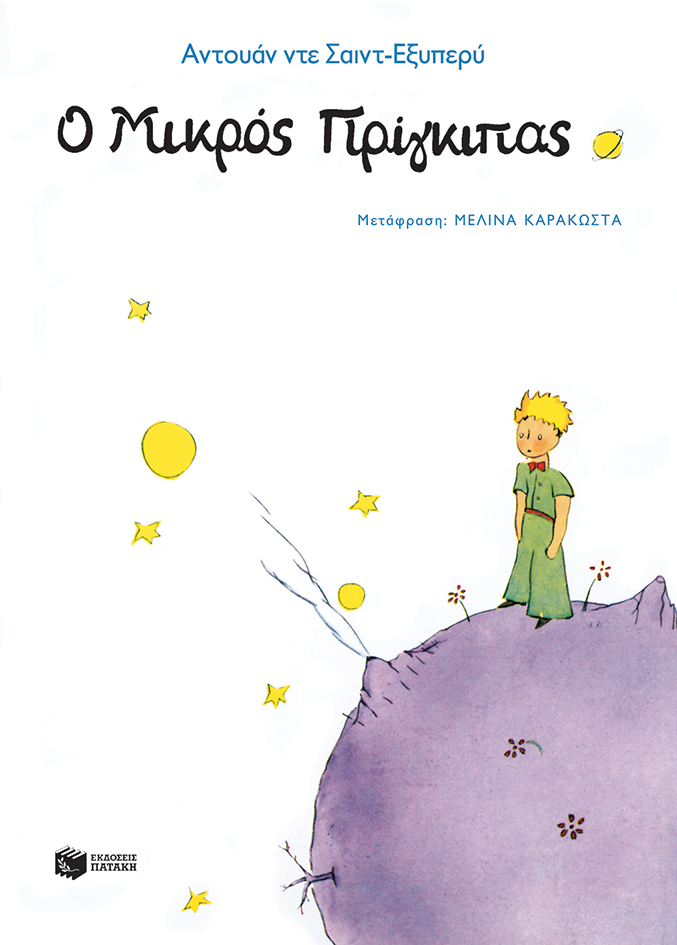
While not originally by a Greek author, the Greek translation of "The Little Prince" is a great starting point for language learners. The story's simple language and enchanting illustrations make it accessible and enjoyable. This beloved classic offers a gentle introduction to Greek vocabulary and sentence structure.
2. "Η Τελευταία Μαύρη Γάτα" by Eugenios Trivizas
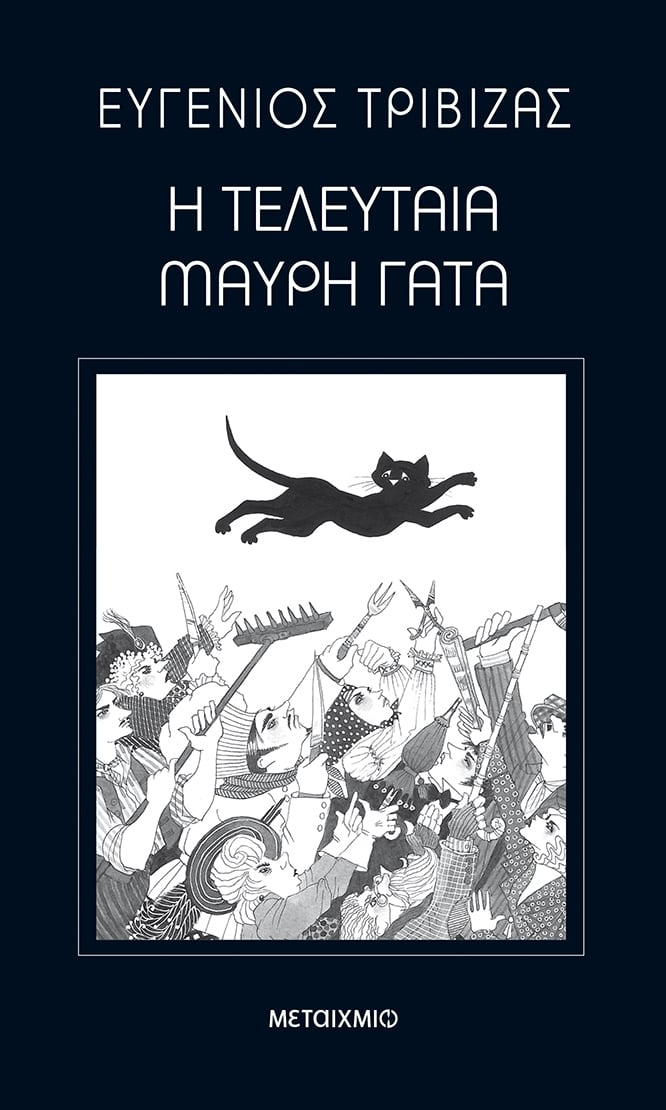
Eugenios Trivizas is a popular children's author known for his imaginative stories. "Η Τελευταία Μαύρη Γάτα" (The Last Black Cat) is a charming tale with a simple plot and clear language. Although it's a children's book, its themes and humor appeal to readers of all ages, making it a great tool for language learning.
3. "Ο Μεγάλος Περίπατος του Πέτρου" by Alki Zei
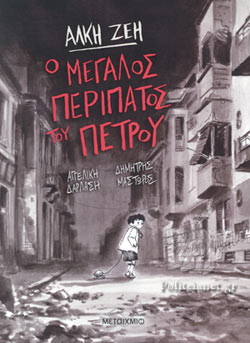
"Ο Μεγάλος Περίπατος του Πέτρου" (Petros' Great Walk) by Alki Zei is a touching story set during World War II, seen through the eyes of a young boy named Petros. The straightforward narrative and historical context provide a compelling and accessible read for language learners, helping them gain insight into both the language and Greek history.
4. "Ένα Παιδί Μετράει τα Άστρα" by Menelaos Lountemis
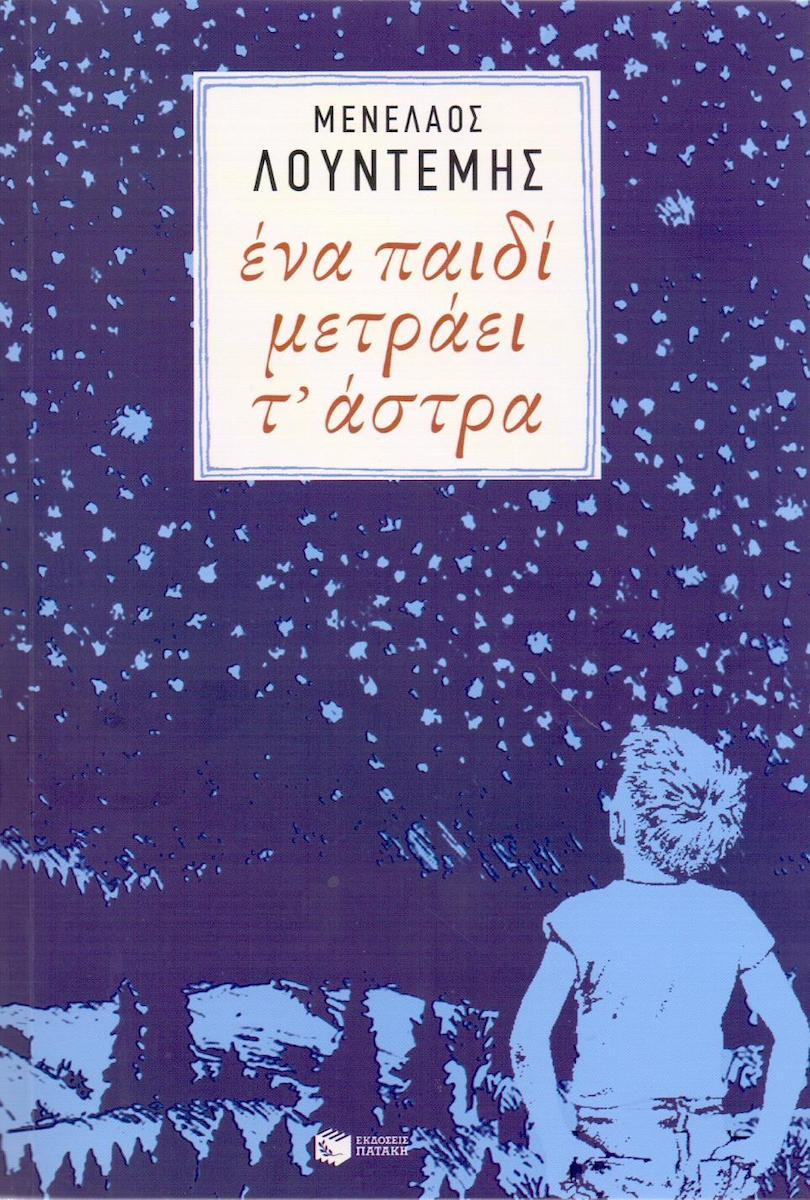
"Ένα Παιδί Μετράει τα Άστρα" (A Child Counts the Stars) by Menelaos Lountemis is a beautifully written coming-of-age story about a boy's journey of self-discovery and dreams. The poetic and evocative language makes it a rewarding read for those learning Greek, offering both literary and cultural enrichment.
5. "Έγκλημα στο Κολωνάκι" by Giannis Maris
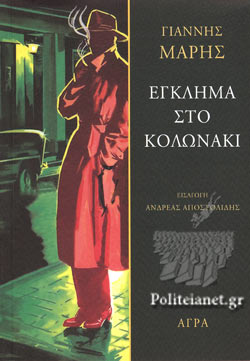
"Έγκλημα στο Κολωνάκι" (Crime in Kolonaki) by Giannis Maris is a captivating mystery novel set in one of Athens' most prestigious neighborhoods. The intriguing plot and well-developed characters make it an engaging read. Maris' clear and concise language is ideal for those looking to improve their Greek while enjoying a thrilling story.
Tips for Reading in Greek
1. Start with Translations: Beginning with translated works like "Ο Μικρός Πρίγκιπας" can make the transition easier, as you're already familiar with the story.
2. Use a Dictionary: Keep a Greek-English dictionary handy to look up unfamiliar words and expand your vocabulary.
3. Take Notes: Jot down new words and phrases as you read. This helps reinforce learning and makes it easier to remember.
4. Read Aloud: Pronouncing words out loud can improve your speaking skills and help you become more comfortable with Greek pronunciation.
5. Practice Regularly: Consistency is key. Try to read a little bit every day to steadily improve your language skills.
Diving into Greek literature is an enriching way to deepen your understanding of the language and culture. These five books are excellent starting points that will make your learning journey enjoyable and engaging. Happy reading!
1. "Ο Μικρός Πρίγκιπας" by Antoine de Saint-Exupéry (Greek Translation)

While not originally by a Greek author, the Greek translation of "The Little Prince" is a great starting point for language learners. The story's simple language and enchanting illustrations make it accessible and enjoyable. This beloved classic offers a gentle introduction to Greek vocabulary and sentence structure.
2. "Η Τελευταία Μαύρη Γάτα" by Eugenios Trivizas

Eugenios Trivizas is a popular children's author known for his imaginative stories. "Η Τελευταία Μαύρη Γάτα" (The Last Black Cat) is a charming tale with a simple plot and clear language. Although it's a children's book, its themes and humor appeal to readers of all ages, making it a great tool for language learning.
3. "Ο Μεγάλος Περίπατος του Πέτρου" by Alki Zei

"Ο Μεγάλος Περίπατος του Πέτρου" (Petros' Great Walk) by Alki Zei is a touching story set during World War II, seen through the eyes of a young boy named Petros. The straightforward narrative and historical context provide a compelling and accessible read for language learners, helping them gain insight into both the language and Greek history.
4. "Ένα Παιδί Μετράει τα Άστρα" by Menelaos Lountemis

"Ένα Παιδί Μετράει τα Άστρα" (A Child Counts the Stars) by Menelaos Lountemis is a beautifully written coming-of-age story about a boy's journey of self-discovery and dreams. The poetic and evocative language makes it a rewarding read for those learning Greek, offering both literary and cultural enrichment.
5. "Έγκλημα στο Κολωνάκι" by Giannis Maris

"Έγκλημα στο Κολωνάκι" (Crime in Kolonaki) by Giannis Maris is a captivating mystery novel set in one of Athens' most prestigious neighborhoods. The intriguing plot and well-developed characters make it an engaging read. Maris' clear and concise language is ideal for those looking to improve their Greek while enjoying a thrilling story.
Tips for Reading in Greek
1. Start with Translations: Beginning with translated works like "Ο Μικρός Πρίγκιπας" can make the transition easier, as you're already familiar with the story.
2. Use a Dictionary: Keep a Greek-English dictionary handy to look up unfamiliar words and expand your vocabulary.
3. Take Notes: Jot down new words and phrases as you read. This helps reinforce learning and makes it easier to remember.
4. Read Aloud: Pronouncing words out loud can improve your speaking skills and help you become more comfortable with Greek pronunciation.
5. Practice Regularly: Consistency is key. Try to read a little bit every day to steadily improve your language skills.
Diving into Greek literature is an enriching way to deepen your understanding of the language and culture. These five books are excellent starting points that will make your learning journey enjoyable and engaging. Happy reading!
Published in
Books
Tagged under
Monday, 15 July 2024 15:50
Education Minister To Introduce More Books Into Students' Lives Starting Next Academic Year
In a bid to instill a love for reading among Greece’s rote-jaded youngsters, the government is bringing more literature to the classroom, Education Minister Kyriakos Pierrakakis told Kathimerini’s Sunday edition.
“Greece is one of the few countries that does not teach entire works in literature classes,” he lamented, adding that this will change from the next academic year. “The aim is for each class to choose two books from at least four options,” he said, adding that these options will stretch from Shakespeare and Penelope Delta, to Arthur Conan Doyle’s Sherlock Holmes adventures.
“If we start with challenging books, few students will be able to break the psychological barrier of finishing it,” the minister said, explaining these choices.
The ministry will also bolster languishing school libraries with new books and a plan “so that they can become an organic part of the school community.” “It sounds like a cliche, but it isn’t: books expand your horizons, increase your curiosity and make you seek and learn new things,” added Pierrakakis.
Originally published on: ekathimerini.com
“Greece is one of the few countries that does not teach entire works in literature classes,” he lamented, adding that this will change from the next academic year. “The aim is for each class to choose two books from at least four options,” he said, adding that these options will stretch from Shakespeare and Penelope Delta, to Arthur Conan Doyle’s Sherlock Holmes adventures.
“If we start with challenging books, few students will be able to break the psychological barrier of finishing it,” the minister said, explaining these choices.
The ministry will also bolster languishing school libraries with new books and a plan “so that they can become an organic part of the school community.” “It sounds like a cliche, but it isn’t: books expand your horizons, increase your curiosity and make you seek and learn new things,” added Pierrakakis.
Originally published on: ekathimerini.com
Published in
Kids Life
Tagged under

